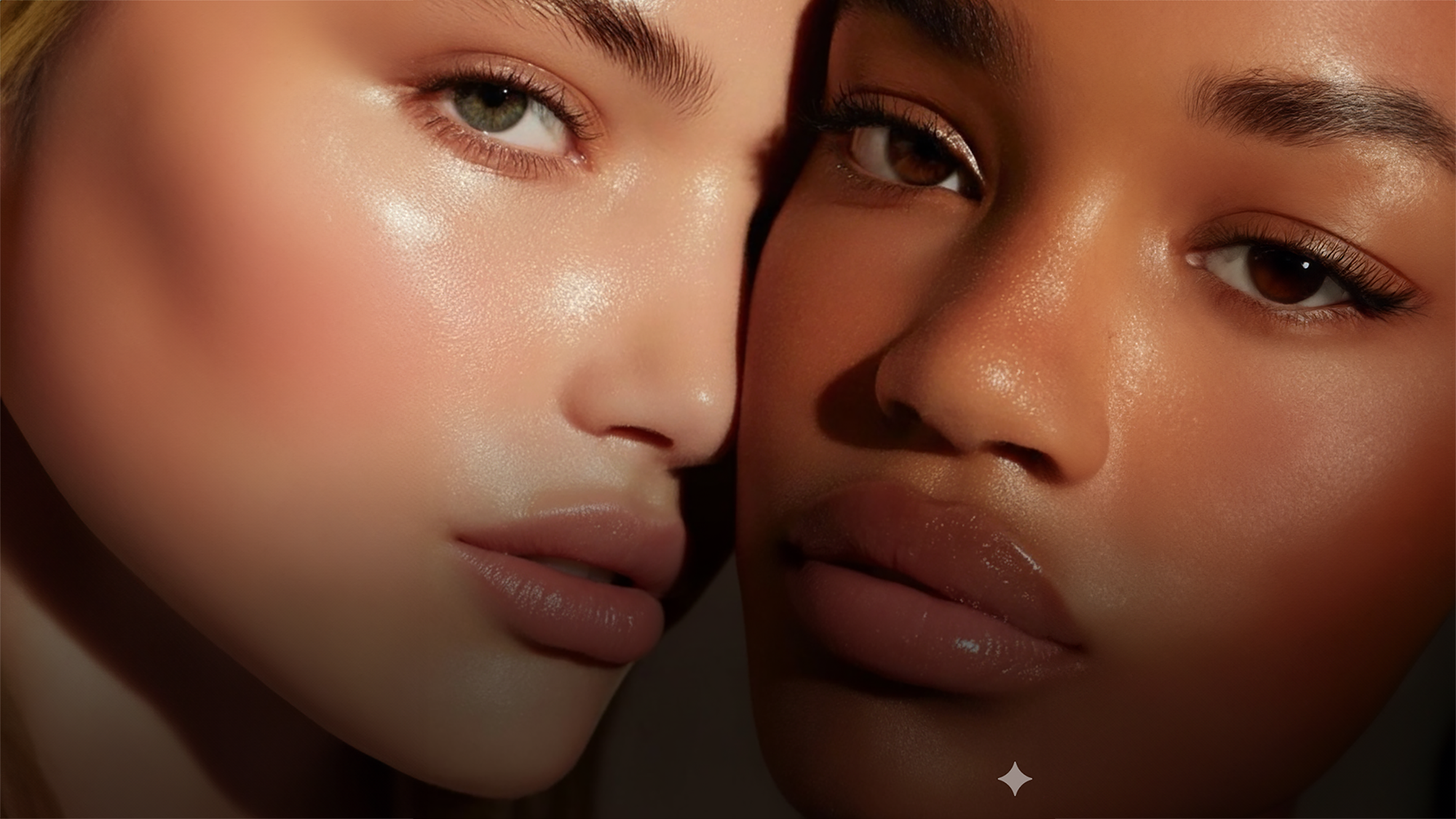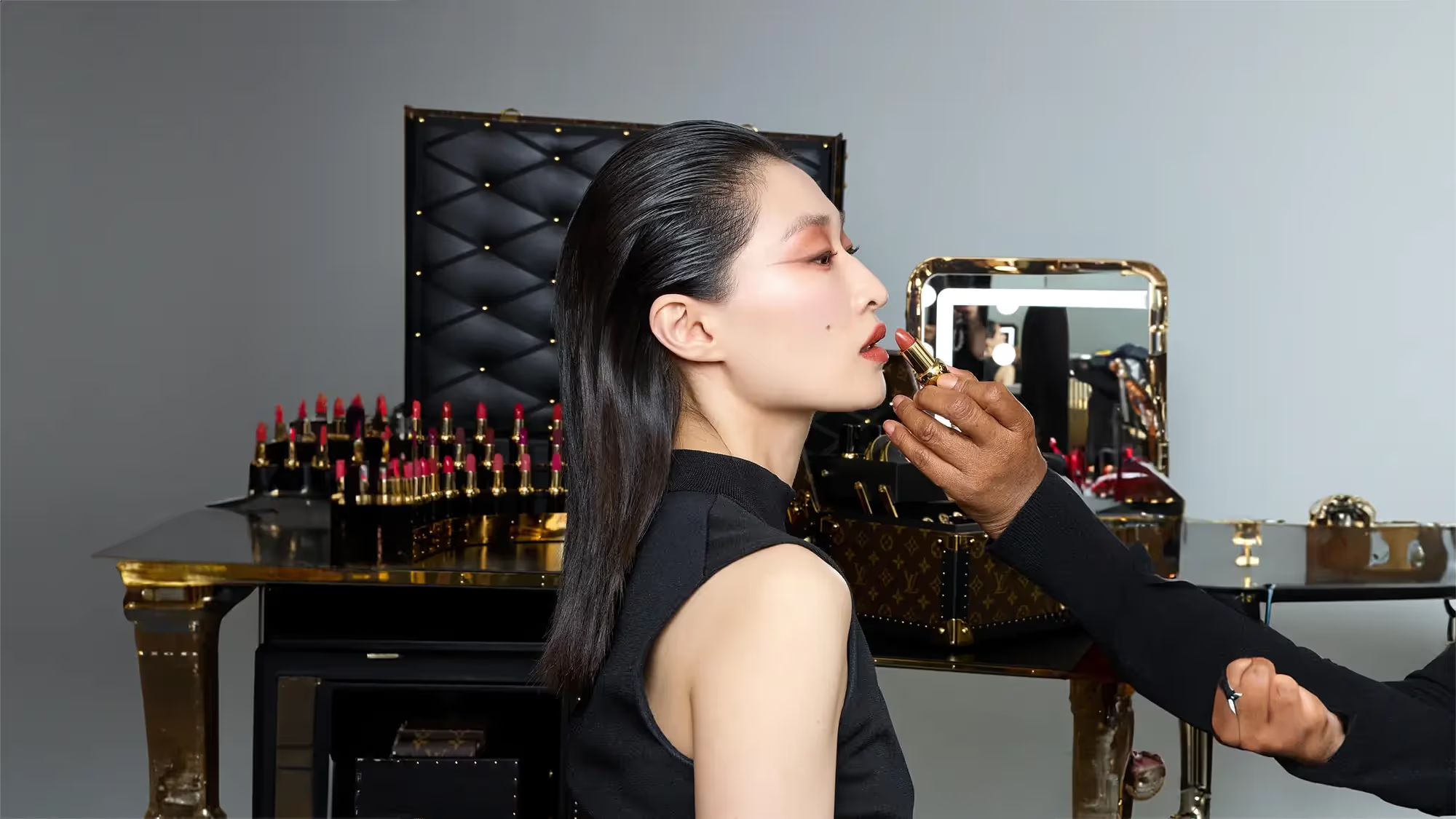Makeup


With the rise of social media, the world of beauty is now at everyone's fingertips, filled with skincare tips, trends, and routines that may not always be suitable or beneficial. However, there is one step that everyone agrees is non-negotiable: applying sunscreen and never skipping it. Regardless of the weather, using sun protection is essential for the health and well-being of your skin. UV rays can cause wrinkles and fine lines, affect collagen and elastin production, lead to skin inflammation, and hyperpigmentation. Not to mention, sun exposure increases the risk of skin cancer.
In the past, sunscreens were undesirable due to their thick, sticky texture and the white residue they left behind. Today, modern formulations protect the skin without leaving any unpleasant traces. With so many options available on the market, choosing the right one can be challenging. Ultimately, the best sunscreen for your skin is the one you consistently use.
Here's how to find the perfect sunscreen for your skin type and needs:
The Difference Between Chemical and Physical Sunscreens
Sunscreens are divided into two categories: mineral and chemical. Mineral sunscreens, also known as physical sunscreens, contain zinc oxide, titanium dioxide, or both, and work by deflecting UV rays from the skin's surface, preventing them from reaching skin cells. This differs from chemical sunscreens, which rely on filters that absorb UV rays and convert them into heat, which is then released from the skin.
Aside from their active ingredients, physical and chemical sunscreens also differ in terms of application. While physical formulations provide immediate protection upon application, chemical sunscreens must be applied at least 15 minutes before sun exposure to allow the ingredients to fully absorb into the skin and become effective.
Choosing between the two types of sunscreens depends on your skin's needs and preferences. Chemical sunscreens are lighter and less likely to leave residue, but some individuals with sensitive skin may experience irritation or allergic reactions to certain chemical filters. It’s also important to consider whether you'll be applying it under makeup. If you plan to double up on sunscreen as a moisturizer, you'll want to look for a hydrating option that suits your skin type.
In the end, the best way to choose between mineral and chemical sunscreen is to try a few formulations and let your skin decide.
The Best Sunscreen for Your Skin Type
Oily Skin
Since oily skin is more prone to acne, using products that clog pores can exacerbate this issue. Look for a non-greasy sunscreen that prevents pore clogging, with a lightweight gel or cream formula that is oil-free and mattifying to help control excess shine. Most importantly, avoid sunscreens that might worsen breakouts, such as those with thick formulations or heavy oils.
Dry Skin
When it comes to dry skin, you'll want to choose a sunscreen that offers both sun protection and hydration. Opt for a moisturizing formula with a creamy or lotion texture, as these formulations can help lock in moisture and prevent dryness. Ingredients like hyaluronic acid, shea butter, glycerin, and ceramides are great for keeping the skin hydrated while maintaining its barrier. As for what to avoid, steer clear of sunscreens containing alcohol, as this ingredient can exacerbate dryness and irritation. Additionally, gel-based sunscreens tend to be less hydrating, and matte-finish formulations can sometimes leave your skin feeling drier.
Mature Skin
If you’re dealing with fine lines, wrinkles, sagging, and a general loss of firmness in your skin, opt for hydrating formulations, as mature skin tends to be drier. Look for a sunscreen specifically designed to target signs of aging, such as those containing peptides and antioxidants, as they can help improve skin texture and firmness, and reduce the appearance of fine lines and wrinkles. If you can't tolerate heavy or greasy products, look for lightweight, non-greasy formulations that are comfortable on the skin.
Sensitive Skin
Finding skincare products suitable for sensitive skin can be challenging. However, opt for gentle, fragrance-free, and hypoallergenic formulations, and you may also want to choose a mineral-based sunscreen, as it’s less likely to cause irritation compared to chemical formulations. Potential irritants to avoid include alcohol, fragrances, parabens, essential oils, and some chemical filters.
How to Choose Between Different Sunscreen Types
Sticks
Sunscreen sticks come in both chemical and mineral formulations and are convenient for on-the-go use. However, the downside is that they are less likely to contain many nourishing skincare ingredients, as the formulation can degrade active ingredients. They also tend to have a thick and sticky consistency, and are more likely to transfer onto clothing.
Lotions
Traditional sunscreens come in lotion form, with skin-friendly ingredients that suit a wide range of skin types. Anyone can use a lotion sunscreen according to their skin’s needs. These types can also come in tinted varieties, which can be great for those looking to even out their skin tone while protecting it.
Sprays
Sunscreen sprays offer a convenient way to apply and reapply sun protection. They are especially beneficial for those with dry skin, as many contain moisturizing ingredients that can help replenish moisture after the drying effects of sun exposure. The downside of this type of sunscreen is that it’s often not applied correctly or sufficiently—simply spraying it on isn’t enough. To use it correctly, hold the can a few inches from the skin, then spray and rub it in, ensuring you repeat the process over all areas until the skin is fully covered.
Powder
Powder sunscreens are gaining popularity due to their unique benefits. They act as a means to protect the skin and absorb excess shine at the same time, making them ideal for those with oily or acne-prone skin. Since they are made of minerals, they’re also perfect for those with sensitive skin who struggle with using chemical formulations. Powders don’t leave behind greasy or sticky residues. They can also be applied over makeup with ease, making them perfect for touch-ups throughout the day.


Bader Al-Kulaib
Bader Al-Kulaib is the CEO of Al-Mudhaf & Al-Kulaib Group, one of Kuwait's leading and diversified business conglomerates, operating across hospitality, real estate, and technology sectors. Working closely alongside his partner Abdullah Al-Mudhaf, the Chairman of the Board, he drives a comprehensive strategy aimed at positioning the group as one of the most influential economic entities in Kuwait and the broader region.
Over the past years, Al-Kulaib has spearheaded strategic expansions that strengthened the group's market presence and enhanced the value of its brands. This has been achieved through the development of an investment portfolio that balances quality with innovation, with a focus on creating unique experiences that reflect the aspirations of the new generation while adhering to global standards. He has also founded and managed several successful companies across diverse industries, demonstrating his ability to build sustainable business models that achieve a balance between rapid growth and sound governance.
In the field of digital media, Al-Kulaib serves as the Chairman of Shasha, a media platform that has become a remarkable success story in the region. Since its inception, Shasha has emerged as a leading platform in the Arab digital content industry, offering a fresh model that combines advanced technology with an innovative media vision. The platform has also received strategic investment from Forta Advisors, reflecting strong confidence in its potential and its capability to become a key player in the future of digital media at both regional and international levels.

Bader Al-Kulaib


Sheikh Fahad Nasser Sabah Al Ahmad Al Sabah
Sheikh Fahad Nasser Sabah Al-Ahmad Al-Jaber Al-Sabah was born in Kuwait City on September 23, 1992. He holds a bachelor's degree in Business Administration and Marketing from the American University.
After graduating, he joined the military service and qualified as a military pilot in the Kuwaiti Ministry of Defense, specializing in the AH-64 Apache helicopter. In 2015, he participated with Kuwaiti forces in Operation Restoring Hope in Yemen.
Between 2012 and 2014, he served as Chairman of the Motocross Committee at Kuwait Quarter Mile Club. On June 26, 2019, he was elected President of the Kuwait Olympic Committee after the closing of the nomination process, becoming the 10th president of the Committee. He was re-elected on December 3, 2023.

Sheikh Fahad Nasser Sabah Al Ahmad Al Sabah


Dr. Noura Almashan
Dr. Noura Mohammed Al-Mashan, a Kuwaiti engineer born in 1981, currently serves as the Minister of Public Works and Minister of State for Municipal Affairs in Kuwait. She holds a PhD in Civil Engineering with a specialization in Coastal Disaster and Oil Spill Engineering from Johns Hopkins University in Maryland, USA becoming the first Kuwaiti female engineer to earn this degree from the university.
Dr. Al-Mashan previously worked as a professor in the Civil Engineering Department at Kuwait University and as an engineering consultant at the Kuwait Ports Authority. She was also a faculty member at Kuwait University until her appointment in January 2024 as Minister of Public Works and Minister of State for Municipal Affairs. In August 2024, she was reappointed as Minister of Public Works.
She has played a prominent role in accelerating road repair projects in Kuwait and improving the quality of services on the country’s streets and bridges.

Dr. Noura Almashan


Dr. Munira Al-Arouj
Dr. Munira Al-Arouj, Consultant in Diabetes at the Ministry of Health in Kuwait and at Dasman Diabetes Institute, was awarded the Sheikh Hamdan bin Rashid Al Maktoum Award for Innovation in Healthcare in January 2025. She received the recognition for developing one of the most advanced mobile applications designed to support diabetic patients in assessing health risk factors and determining their ability to fast during the month of Ramadan under medical supervision.
The application, created by Dr. Al-Arouj and her team, is the world's first global risk assessment calculator for fasting-related health concerns. It analyzes user-inputted data to provide an accurate health risk evaluation and determines the potential level of risk associated with fasting, based on integrated, evidence-based medical guidelines and advanced algorithms.
Dr. Al-Arouj is widely regarded as one of the leading diabetes experts in Kuwait and the region, contributing to the advancement of innovative technological solutions aimed at improving patient care.

Dr. Munira Al-Arouj


Nour Abdul
Nour Abdul, born Nour Abdulhussain and professionally known as Nour Abdul, is a distinguished Kuwaiti fashion designer and the founder of her eponymous fashion label. She graduated in 2019 from the Miami International University of Art & Design in the United States, an institution recognized by the Business of Fashion (BoF) Education Council as one of the top schools in the U.S. for fashion design degrees.
During her time in Miami, Nour refined her technical and creative skills, laying the foundation for launching her own fashion brand and later bringing her designs back to Kuwait. Her creative vision draws from a fusion of her Arab heritage and her experiences in the United States, reflected in collections that seamlessly blend cultural traditions with modern Western aesthetics.
The Nour Abdul brand is known for its focus on conscious craftsmanship and luxury, with a strong commitment to sustainability across both design and production. Her collections feature a variety of unique pieces that highlight her passion for detail, precision, and refined taste. Today, Nour's designs are available through her official website, reaching clients worldwide.

Nour Abdul


Eisa Alhabib
Eisa Alhabib is a Kuwaiti filmmaker, content creator, and influencer. He holds a bachelor's degree in Health Services, earned in 2015 from the University of Calgary, Canada. In early 2021, he launched "Eshrahli", a digital program dedicated to answering questions on Arab youth's minds about cultures, customs, and traditions across the region, while spotlighting the richness of cultural diversity through compelling storytelling. The program has since garnered over one billion views across social media platforms.
Today, Alhabib has over 1 million followers on Instagram and 1.5 million subscribers on YouTube. He has collaborated with numerous government entities to produce educational and awareness campaigns, including the World Government Summit, COP28, Expo 2020 Dubai, FIFA World Cup Qatar 2022, and Dubai's Roads and Transport Authority.
In 2017, he won the JCS International Young Creatives Award at the International Emmy Awards for his short film "Domestic Cycle." Most recently, in 2024, his name was featured on the Forbes Under 30 list, recognizing him as one of the region's most influential young creatives.

Eisa Alhabib


Deema Al-Ghunaim
Deema Al-Ghunaim is a Kuwaiti architect and multidisciplinary artist, and the founder and CEO of Madeenah. She earned her Bachelor's degree in Architectural Engineering from Kuwait University in 2008, followed by an MFA from the Ruskin School of Art, University of Oxford, UK, in 2024.
Her artistic practice explores linguistic and mythological reflections through spontaneous, process driven approaches, employing raw footage, performance art, and watercolor. Through her work, she seeks to examine points of resistance and dissolution within contemporary systems while imagining alternative ways of living and moving.
In 2012, Al-Ghunaim co-directed "Kethra", the first Kuwaiti contribution to the Venice Architecture Biennale. She also founded Madeenah, a multidisciplinary platform dedicated to fostering dialogue on Kuwait's urban environment. Among its initiatives is NAKTUB, a creative Arabic writing program for children, which she helped establish and support through Madeenah and other cultural ventures.
Beyond her independent practice, Al-Ghunaim has worked as a visiting professor at Kuwait University, contributed as an architect with Alpha Architects, and served in the Master Plan Department at Kuwait Municipality. Her multidisciplinary body of work spans contemporary art, architecture, language, translation, creative writing, and experimental artistic practices.

Deema Al-Ghunaim


Lama AlOraiman
Lama AlOraiman is a young Kuwaiti mechanical engineer and an active voice in the fields of space and technology. In 2022, she received the Emerging Space Leaders Award from the International Astronautical Federation (IAF). She is the Co-Founder and COO of Ignition LLC, the first Kuwaiti company dedicated to space research and exploration, and the Founder and CEO of BluDot, Kuwait's first space research company.
AlOraiman also serves as Vice-Chair of the IAF's Emerging Space Systems Committee for the Middle East and Central Asia. In 2023, she made history as the first Kuwaiti and Arab woman to be appointed Ambassador of the International Astronautical Congress (IAC), the world's largest space conference. That same year, she was named to Forbes Middle East's Under 30 list.
From a young age, AlOraiman has been committed to advancing Kuwait's presence in the space sector and inspiring Kuwaiti youth to engage in this vital field. At just 18, she became Kuwait's National Point of Contact at the Space Generation Advisory Council and later served as National Coordinator for World Space Week 2019. Her leadership has earned her recognition from international organizations, including invitations from NASA and SpaceX to contribute to space related initiatives highlighting the global impact of her work.

Lama AlOraiman


Alymamah Rashed
Alymamah Rashed
A young Kuwaiti visual artist earned her Master of Fine Arts from Parsons School of Design in 2019, after completing her Bachelor of Fine Arts at the School of Visual Arts in 2016.
She has participated in several exhibitions in New York City, including at the he Czech Centre, Parasol Projects, and The New School. She was awarded the MFA grant and scholarship program from Kuwait's Ministry of Higher Education and was also a fellow in the Development Initiative Program, supported by the National U.S. Arab Chamber of Commerce, Kuwait's Ministry of Higher Education, the Embassy of Kuwait, and the Kuwait Foundation for the Advancement of Sciences.
Recently, Dior selected her as one of the creative talents to participate in the 10th edition of the Dior Lady Art project a collaboration that bridges art, heritage, and haute couture. She reimagined the iconic Lady Dior bag with two unique designs, one inspired by a seashell found on Failaka Island, and the other by the springtime humaith flower.
With this historic achievement, she places Kuwaiti art firmly on the global fashion map and highlights the region’s vital role in the international creative scene.

Alymamah Rashed


Nadia Bader Al-Hajji
Nadia Bader Al-Hajji is a Kuwaiti businesswoman and the CEO of Petrochemical Industries Company (PIC). She joined PIC, a subsidiary of the Kuwait Petroleum Corporation, in 2019 and assumed her current role as CEO in November 2022.
Al-Hajji also serves as Chairperson of the Board of EQUATE Petrochemical Company and Chairperson of the Board of the Kuwait Olefins Company. Additionally, she is a board member of the Canadian Kuwaiti Petrochemical Company and serves as board member and treasurer of the Gulf Petrochemicals and Chemicals Association (GPCA). She chairs the Diversity and Inclusion Initiative at the Kuwait Petroleum Corporation and its subsidiaries, among other leadership roles.
Recognized for her leadership, Al-Hajji has been featured in Forbes Middle East's list of the 100 Most Powerful Businesswomen for 2023, 2024, and 2025. Her achievements exemplify female leadership in the oil and petrochemical sectors, highlighting the important role of women in Kuwait's industrial and economic landscape.

Nadia Bader Al-Hajji


Henadi Al-Saleh
Henadi Al-Saleh is the Chairperson of Agility Logistics, one of Kuwait's leading logistics companies. She joined Agility in 2007 to lead investor relations, financial planning, and analysis, and was appointed Chairperson in 2014. Under her leadership, Agility employs over 65,000 people and operates across six continents.
Al-Saleh also serves on the Board of Gulf Warehousing Company (GWC) and the Global Advisory Board of the Council on Foreign Relations (CFR) in the U.S. She previously held the position of Head of Debt and Capital Markets at National Bank of Kuwait Capital.
Under her guidance, Agility participates in initiatives such as "Kuwait Codes", training students in essential digital skills. Al-Saleh is a strong advocate for women's empowerment, particularly in technology and entrepreneurship, delivering lectures to female students at X Academy by CODED on tech and entrepreneurship topics. She has been recognized in Forbes Middle East's list of the 100 Most Powerful Businesswomen in 2025.

Henadi Al-Saleh


Jafar Islah
Jafar Islah is one of Kuwait's most prominent visual artists. Born in 1946, he earned a Bachelor's degree in Fine Arts from the University of Berkeley, California, in 1970, studying under renowned instructors such as Ron Kitai and Gerald Ballen.
After returning to Kuwait, Islah worked as Art Director at Alghanim Company, producing innovative designs that reflected his attention to the environment. He held his first exhibition in 1972, showcasing works inspired by local cultural symbols such as "Makhadda", "Ruki", and "Bateekh".
Over his career, Islah has participated in numerous local and international exhibitions, including his retrospective "Journey" held in February 2025, under the patronage of the National Council for Culture, Arts and Letters and hosted by the Contemporary Art Platform (CAP). The exhibition spanned six decades of his work, from 1965 to 2025, and featured for the first time several rare and archival pieces.
In addition to his visual art, Islah has published several books documenting his artistic journey, including "Soul of Egypt" which combines photographs and documents capturing the artistic and cultural life of Egypt. Through his work, he aims to present a humanistic vision promoting peace and coexistence, using art as a bridge between cultures and a means to document history.
Islah is widely regarded as one of the most influential artists in the development of Arab visual arts on the global stage.

Jafar Islah


Abdullah Ghazi Al-Mudhaf
Abdullah Ghazi Al-Mudhaf is a Kuwaiti journalist and entrepreneur, recognized as one of the most influential figures in media and digital production in Kuwait. He serves as Deputy Editor in Chief of Al-Qabas newspaper, overseeing content development and expanding the paper’s digital presence, leading it to excellence in digital media.
Al-Mudhaf is also the co-founder and Chief Content Officer of Shasha, a leading production and streaming platform in the Gulf region, dedicated to developing local and regional drama production. In November 2024, he led Shasha into a strategic partnership with Forta Advisors, strengthening the platform's position in the digital production market.
He has also launched initiatives to support young talent in drama production, ensuring Shasha provides opportunities for emerging creators to develop their projects. Prior to joining Al-Qabas, Al-Mudhaf worked at several prestigious media institutions, gaining extensive experience in journalism and media. He is known for his ability to adapt to rapid changes in the media industry and his dedication to developing innovative digital content.

Abdullah Ghazi Al-Mudhaf


Abeer Al Awadhi
She is one of the leading figures in cybersecurity in Kuwait and the region, recognized for her expertise and professionalism in technology and digital transformation. In February 2025, she was appointed Director of the National Cybersecurity Center for a four-year term, renewable.
Al-Awadi has a strong academic background, holding advanced degrees in Computer Science and Information Security, which qualified her for numerous leadership positions in the tech sector. She has been part of specialized teams focused on developing technical systems and strengthening security measures to protect data across both government and private institutions.
Throughout her career, Al-Awadi has contributed significantly to enhancing cybersecurity policies and implementing advanced strategies to defend against digital threats, safeguarding Kuwait’s critical digital infrastructure against ongoing cyber risks.

Abeer Al Awadhi


Shahad Alsabeeh
Shahad Alsabeeh is a prominent Kuwaiti business and marketing professional, currently serving as Business Development Manager at Ali Alghanim & Sons Automotive Company. She has extensive experience in supporting youth initiatives and cultural events, demonstrating a strong commitment to nurturing young talent across various fields, including design, fashion, and the arts.
Alsabeeh has been a key supporter of Oud Fashion Talks, an initiative aimed at promoting sustainability in the fashion industry while providing a platform for local designers to connect with their international peers. In addition, she actively participates in community events and discussions, for example, she appeared on the radio program "Ibra" on 360FM, where she discussed topics related to social responsibility and the role of the private sector in supporting young talent.

Shahad Alsabeeh


Abdulrahman Bedah Al-Mutairi
Abdulrahman Bedah Al-Mutairi was born in 1977, and is a Kuwaiti politician currently serving as the Minister of Information and Culture of Kuwait since January 17, 2024. He holds a Bachelor's degree in Psychology and Political Science from the College of Social Sciences at Kuwait University.
Al-Mutairi has held numerous positions throughout his career, including Minister of Information and Culture, and Minister of State for Youth Affairs from 2020 until December 28, 2021. He returned to the same ministry from August 1, 2022, to January 17, 2024. He also served as Minister of Awqaf and Islamic Affairs from June 18, 2023, to January 17, 2024.
In addition, he held the position of Director General of the Public Authority for Youth in 2016 and served as Assistant Undersecretary for Youth Development at the Office of the Minister of State for Youth from 2014 to 2015. Al-Mutairi also worked as Director of the Technical Office at the Ministry of Information in 2012, and as a Monitor at the Office of the Undersecretary of the Ministry of Information in 2011. Earlier, he was responsible for Moroccan media affairs in 2007 and served as Administrative and Financial Officer at the Kuwaiti Media Office in 2005.
He managed the Technical Office at the Ministry of Information between 2011 and 2014, was Editor in Chief of Nebras magazine from 2004 to 2005, and served as a Diplomatic Attaché at the Kuwaiti Embassy Media Office in Rabat from 2004 to 2007. He also worked as a Media Researcher in the Arab States Media Department from 2002 to 2004, a Public Relations Officer at the Office of the Director General of Finance at the Ministry of Interior from 1999 to 2002, and a Public Relations Officer at the Office of the Director General of Nationality from 1996 to 1999.
Since 2019, he has been a member of the Board of Trustees of the Arab Center for Youth Empowerment, representing Kuwait.

Abdulrahman Bedah Al-Mutairi


Faisal Alagel
Faisal Alagel is the son of the renowned Kuwaiti artist Abdulrahman Alagel. He is a Kuwaiti media professional and serves as the founder and manager of Abdulrahman Alagel's business affairs. Faisal is also the host of the popular podcast (Without Paper), where he presents episodes covering a wide range of topics, including political, social, and cultural issues. The podcast features discussions with diverse guests, aiming to provide balanced and respectful content for all perspectives.
Without Paper was listed among Apple Podcasts favorites for Summer 2024, reflecting its quality and popularity among listeners. In September 2024, Faisal hosted his father, Abdulrahman Alagel, on the podcast, where they discussed various topics together. Although Faisal studied Pharmacy, he ventured into media through his work on "Without Paper" establishing himself as a notable voice in Kuwaiti digital broadcasting.

Faisal Alagel


Bader Nasser Al-Kharafi
Bader Al-Kharafi is a prominent Kuwaiti businessman, born in 1977. He earned his Bachelor’s degree in Mechanical Engineering from Kuwait University in 2002, followed by an MBA from London Business School in 2016.
Al-Kharafi began his career at Al-Kharafi Group in 2002 as a Coordination Engineer and steadily advanced through the ranks, becoming Chairman of the Executive Committee in 2012 following the passing of his father, Nasser Al-Kharafi. In 2017, he assumed the role of Chairman and CEO of Zain Group, leading the company to significant growth in the telecommunications sector. He currently serves as Vice Chairman and CEO of Zain Kuwait.
Recognized for his influence, Al-Kharafi was ranked first on Arabian Business list of the 100 Most Influential Arabs. He also holds senior leadership positions in multiple companies, including Vice Chairman of Gulf Cable & Electrical Industries, Vice Chairman of National Investments Company, and is the founder of BNK Holding. In March 2024, he was appointed Chairman of Gulf Bank in Kuwait, a position he resigned from in early 2025.
Al-Kharafi's leadership and commitment to sustainability have earned him recognition, including third place on Forbes’ Middle East Sustainability Leaders list for 2024 and 38th on Forbes’ list of the Most Powerful CEOs in the Middle East the same year.

Bader Nasser Al-Kharafi


Shaikha Al Majed
Shaikha Al Majed is a distinguished Kuwaiti inventor, widely recognized for creating the "Electronic Pen for the Blind", a device designed to facilitate writing and reading for visually impaired individuals. The pen functions similarly to a regular writing instrument but prints Braille characters on paper when pressed with the thumb, allowing blind users to write without relying on traditional manual methods. The device includes a Braille character board and a writing pen, originally developed to assist her visually impaired cousin in his studies.
The invention has received widespread acclaim from those who have tested it and has been slated for broader adoption in schools and centers for the visually impaired in Kuwait. The pen was granted a U.S. patent in 2008 and has been honored in numerous international exhibitions. Among its accolades, it won the Gold Medal at the International Women's Invention Exhibition in Korea, the Gold Medal at the International Inventions Exhibition in Taiwan, the Gold Medal at the Creativity and Innovation Competition in Doha, Qatar, and represented Kuwait at the International Inventions Exhibition in Italy.
Shaikha Al Majed has also been formally recognized by the Ministry of Justice in Kuwait, with the Minister of Justice praising her achievements, and the Prime Minister providing both moral and material support for her groundbreaking work.

Shaikha Al Majed


Farah Almutawa
Farah Al-Mutawa is a young Kuwaiti inventor known for creating "Sail Safely", an innovative maritime safety system designed to protect boats from fire, sinking, and collisions, while facilitating faster and more efficient rescue operations. The system is based on a magnetic card carried by the boat owner, containing personal information and details about the vessel. When a passenger boards and disembarks, the data is sent to maritime rescue teams, enabling them to quickly locate the individual and respond effectively to any emergency situation.
This invention has received widespread recognition. Farah Al-Mutawa was awarded the Silver Medal at the Challenge & Innovation Forum, one of the region's leading scientific events, and also showcased her invention at the 11th International Inventions Exhibition in the Middle East, held in Kuwait.

Farah Almutawa


Donna Sultan
Donna Sultan is the Chairwoman and CEO of KEO International Consultants, one of the leading multidisciplinary consulting firms in the Middle East. With a career spanning over 40 years, Al-Sultan joined KEO in 1985, became CEO in 1991, and was appointed Chairwoman and CEO in 2016. Under her leadership, KEO expanded into a global consulting firm with a strong presence in the Middle East and Europe, employing over 2,600 professionals across 11 offices worldwide.
The firm specializes in areas such as project and construction management, architecture, structural engineering, sustainability, digital consulting, urban planning, and landscape design. Al-Sultan has also overseen the development of subsidiary companies including InSite (urban planning and landscape design), C-Quest (cost consulting), and F&M+ (facilities management), diversifying revenue streams and strengthening the company’s market position.
In October 2024, KEO launched OPTIMA, a facilities management consultancy, and opened a new office in Jordan in September 2024. Additionally, the firm designed the Kuwait Kidney Diseases and Transplant Center, which opened in June 2024.
Al-Sultan was recently featured in Forbes Middle East's "100 Most Powerful Women" list for 2025, ranked second in Construction Week's "Power 150" list of industry leaders, and was recognized among Entrepreneur’s "50 Leading Women".

Donna Sultan


Dana Al-Mutawa and Sheikha Sharifa Al Sabah and Alzainah Albabtain
Dana Al-Mutawa and Sheikha Sharifa Al-Sabah are experts in sustainable agriculture.
Dana Al-Mutawa is a Kuwaiti specialist in sustainable farming, playing a key role at Sadeer Farm, where she organizes workshops and training programs to promote sustainable agriculture and environmental awareness. She collaborated with Gulf Bank to run a training program titled "A Day at Sadeer Farm" alongside Alzaina Al Babtain and Sheikha Sharifa Al-Sabah, aiming to introduce participants to the fundamentals of sustainable farming and provide the knowledge and skills necessary for environmentally friendly agricultural practices.
Additionally, Al-Mutawa hosts field visits at Sadeer Farm, offering visitors hands-on experiences in planting and harvesting, which helps raise awareness about the importance of sustainable agriculture and its role in improving quality of life.
Sheikha Sharifa Al-Sabah is a prominent Kuwaiti figure serving as the official spokesperson for the Kuwaiti Fund for Arab Economic Development. She actively contributes to raising awareness about sustainable agriculture in Kuwait through participation in workshops and training sessions, such as those organized at Sadeer Farm in collaboration with Dana Al-Mutawa and Zeina Al-Babtain.
Furthermore, Sheikha Sharifa has participated in media appearances to highlight the initiatives of the Kuwaiti Fund for Arab Economic Development, including interviews on programs such as Diwaniyat Al-Yaqout, Ansari on Nabd Al-Kuwait Radio. For more information on their activities and contributions, audiences can follow her appearances on television and radio programs like "Layali Kuwait".
Alzainah Al-Babtain is a Kuwaiti entrepreneur, agricultural expert, and content creator, as well as the founder of the Plantnmore store. She is a well-known figure on social media, where she shares videos offering agricultural insights, tips, and methods for home gardening. Her accounts have amassed more than one million followers.
Alzainah broke a Guinness World Record for hosting the largest gardening lesson in the world, held at AlShaheed Park in collaboration with the Home & Garden Channel and the beIN Media Group.
Leading this remarkable event, Al-Zeina guided 286 participants through the basics of planting a variety of health beneficial plants, while also correcting misconceptions about gardening in Kuwait. Through this initiative, she encouraged Kuwait’s residents to embrace gardening year round.

Dana Al-Mutawa and Sheikha Sharifa Al Sabah and Alzainah Albabtain


Laila Almutairi
Laila Hilal Al-Mutairi serves as the Chief Executive Officer of INJAZ Kuwait, an organization established in 2005 with the mission of empowering youth in three key areas: entrepreneurship, financial literacy, and workforce readiness. Under her leadership, the association focuses on inspiring young people, uncovering their talents and creativity, and honing their diverse skills across various fields, providing them with real opportunities to excel and succeed.
During the COVID-19 pandemic, Laila Al-Mutairi oversaw the training of over 10,000 students, demonstrating the organization’s ability to continue delivering educational and training programs even under the most challenging circumstances. She also represented Kuwait's leadership in youth empowerment as a speaker at the 2024 FinTech Summit, highlighting the importance of equipping young people with the knowledge and skills needed to navigate future challenges.
Laila Al-Mutairi’s career reflects a genuine commitment to empowering youth and enhancing their capabilities, positioning INJAZ Kuwait as a pioneering model in supporting and enabling the next generation both locally and internationally.

Laila Almutairi


Adel Alwasis
Adel Al Wasis is the inventor of the Cold Steam Irrigation Project. He developed an innovative system that converts saline and non potable water into pure, salt free water by using a vacuum tank to lower the boiling point of water, combined with solar energy to heat the water and provide the necessary power for the system.
Over more than ten years of research and innovation, Al Wasis has introduced several groundbreaking solutions addressing critical challenges, most notably water scarcity in the Gulf region.
The Kuwaiti inventor earned first place across the Gulf in the competition for the best water purification and treatment project, held at the GCC Pavilion during Expo 2020 Dubai. He also showcased his invention at the Expo in Doha, Qatar, in 2023. Additionally, his invention of a fire rescue device has received patents from both the United States and the Gulf Cooperation Council.

Adel Alwasis


Hashim and Amna Naseeb
Hashim and Amna Naseeb Two prominent Kuwaiti designers in the world of event and celebration planning are renowned for their exceptional ability to blend luxury with innovation.
Every event they organize becomes a unique visual experience, where refined touches are harmoniously combined with authentic Kuwaiti elements, giving each occasion a distinctive character. They have designed numerous sophisticated events, including collaborations with international brands in Kuwait, offering a unique model that seamlessly merges global standards with local authenticity.

Hashim and Amna Naseeb


Dr. Abdullah Al Sumait
Dr. Abdullah bin Abdulrahman Al Sumait is a prominent figure in the field of charitable and humanitarian work. He is the son of Sheikh Dr. Abdulrahman Al Sumaait, the founder and Chairman of Direct Aid Society (formerly the Africa Muslims Committee). The organization, established in 1981, began as a volunteer NGO focused on development in Africa’s most vulnerable regions, adopting a scientific approach to its work. Education, in all its forms, has been central to its mission, with the motto: "Education is a legitimate right for every child in Africa."
After eighteen years of continuous contribution, the organization officially changed its name from the Africa Muslims Committee to Direct Aid Society in 1999 to reflect the expansion of its work and charitable projects. Today, it operates in 31 countries worldwide, providing humanitarian, educational, and healthcare assistance, particularly in impoverished areas.
Under Dr. Abdullah Al Sumait's supervision, Direct Aid Society has implemented major initiatives, including the construction of hospitals and medical clinics, the establishment of schools and educational centers, and the execution of health and relief projects across multiple regions. Through his efforts, Abdullah Al Sumait demonstrates a profound commitment to his father's vision of serving humanity and promoting knowledge, making him one of the leading figures in Kuwaiti and global philanthropic work.

Dr. Abdullah Al Sumait


Shaikha Al-Hajeri
Shaikha Al-Hajeri is a prominent Kuwaiti entrepreneur and environmental activist, recognized as the driving force behind the success of Dar Shaikha. She oversees the Dar Shaikha Farm in Al Wafra, which is distinguished by its expansive green spaces, olive trees, and artificial lakes, making it a unique destination for families and nature enthusiasts.
Dar Shaikha is part of Green Fields Company, established in 1980, and has played a significant role in environmental preservation in Kuwait. The project has contributed to greening many areas in the country, including Gulf Road, Al Khiran Park, and various lawns, with the latest initiative involving the greening of Airport Road in collaboration with the Ministry of Public Works.
Under the leadership of its CEO, Shaikha Al-Hajeri, Green Fields Company collaborated with Minister Noura Al-Mashan to green the roads leading to and from the airport in preparation for the GCC leaders, summit in 2024. Working alongside specialized landscape engineers, a comprehensive plan was implemented to develop continuous green spaces using native plants adapted to Kuwait's environment. The plants were arranged to maximize both aesthetic appeal and sustainability, while also reducing pollution and improving air quality through the strategic planting of trees and suitable vegetation.
Shaikha Al-Hajeri played a pivotal role in raising environmental awareness among citizens, encouraging their active participation in the project through awareness campaigns and workshops.
Opened in January 2019, Dar Shaikha initially featured eight lakeside cabins, a small market, and a café. Since then, it has expanded into a full recreational destination for visitors across Kuwait, including retail stores, dining areas, a sports center, and a wide variety of plants and trees sourced from around the world. Dar Sheikha demonstrates a deep commitment to environmental sustainability and serves as a model for eco friendly projects in Kuwait.
The name "Dar Shaikha" is inspired by Shaikha Al-Hajeri's late grandmother, a nature lover who cherished visits to Al Wafra. Shaikha Al-Hajeri has uniquely honored her grandmother's legacy through this project, preserving her love for nature and extending it to the community.

Shaikha Al-Hajeri


Shaima Hassan
Shaima Hassan is the co-founder and CEO of Velvet Desert Jewelry, a Kuwaiti jewelry brand she established in 2021 alongside her sister, Faiza Ghodrzy. The sisters drew inspiration from their father, a jeweler, especially from accompanying him on business trips during their childhood, which gave them early exposure to the jewelry industry on a global scale.
From the deserts of the GCC, Shaima and Faiza founded Velvet Desert Jewelry with a mission to offer high quality pieces at accessible prices. Shaima oversees the creative aspects of the brand as Head of Product, managing design, creative direction, and marketing. She emphasizes craftsmanship and innovative design to create visually striking, unique pieces that align with the brand's vision.
Her background in industrial engineering provides Shaima with a distinctive perspective, allowing her to combine creativity with efficient production processes and enhanced user experience. Before pursuing jewelry full-time, Shaima worked as a rotational oil field engineer, performing field tests on drilling equipment to gather accurate data from wells and surrounding areas. She eventually left the oil industry to follow her passion in the world of jewelry.

Shaima Hassan


Sheikha Bibi Al-Yousef Al-Sabah
Sheikha Bibi Al-Yousef is a prominent Kuwaiti figure in social work, widely recognized for her ongoing efforts to support women's issues in Kuwait and improve their living conditions. Sheikha Bibi is regarded as one of the leading advocates for Kuwaiti women's empowerment, actively working to enhance housing conditions and ensure proper care and services for women.
She currently serves as Head of the Women's Housing Affairs Team at the Public Authority for Housing Welfare. In this role, Sheikha Bibi emphasizes the importance of direct communication with citizens, welcoming their suggestions and complaints regarding women's housing through multiple channels, including WhatsApp, email, and the "Tawasul" service via the Sahel app.
Sheikha Bibi regularly participates in media programs and public events, using these platforms to express her views and raise awareness on social issues that impact Kuwaiti society.

Sheikha Bibi Al-Yousef Al-Sabah


Free Jabriya
Free Jabriya Company is a Kuwaiti company specializing in artistic and entertainment production, founded in 2018 by creatives Ali Al-Nisf and Jassim Al-Qames. The company has established itself as one of the leading names in delivering innovative musical and theatrical performances in Kuwait and across the Gulf region.
Known for its pioneering approach to artistic production, Free Jabriya aims to provide exceptional entertainment experiences through live performances and television productions. The company combines creativity and innovation, producing content that resonates with contemporary audiences.
Ali Al-Nisf serves as the Executive Producer and Co-Founder, playing a key role in executing numerous successful projects. Jassim Al-Qames, the Creative Director and Co-Founder, is recognized for his distinctive artistic vision and his ability to transform concepts into visually and musically compelling performances.
Notable productions include the "Miami Show", a grand musical performance featuring popular songs presented with innovative arrangements/ the "Macintosh" Music Festival, which blends Gulf and electronic music with precise artistic coordination; and the theatrical musical performance "Quraysh", combining drama and music into a unique artistic experience.
Known for its pioneering approach to artistic production, Free Jabriya aims to provide exceptional entertainment experiences through live performances and television productions. The company combines creativity and innovation, producing content that resonates with contemporary audiences.
Ali Al-Nisf serves as the Executive Producer and Co-Founder, playing a key role in executing numerous successful projects. Jassim Al-Qames, the Creative Director and Co-Founder, is recognized for his distinctive artistic vision and his ability to transform concepts into visually and musically compelling performances.
Notable productions include the "Miami Show", a grand musical performance featuring popular songs presented with innovative arrangements, the "Macintosh" Music Festival, which blends Gulf and electronic music with precise artistic coordination, and the theatrical musical performance "Quraysh", combining drama and music into a unique artistic experience.

Free Jabriya


Lulowa Al-Mulla
Lulowa Al-Mulla is a Kuwaiti actress, born on April 19, 1988, who gained fame with her iconic phrase "Nazaka." She has appeared in numerous television and theatrical productions.
Her artistic journey began with the group "Shno Ya'ni", participating in several dramatic sketches broadcast on their YouTube channel. She later joined Loyac, where she engaged in various theatrical and creative activities. Based on a recommendation from a friend, she received an offer to appear in promotional materials for a major company, which led to her first commercial for Zain Kuwait, widely aired on Kuwaiti and regional channels.
Lulowa transitioned to television drama in 2015 with the series "Omna Rou7at Al-Janna", portraying the character Nouf. She continued to build her career with roles in series such as "Nwaya" and "Bayaat Al-Nakhi" in 2016. Known for her captivating personality and distinctive performance style, Lulowa has become widely popular across Kuwait and the Gulf region.
She has a strong social media presence, with over 1.2 million followers on Instagram, and has also participated in numerous theater productions and films, showcasing her versatility as a performer.

Lulowa Al-Mulla


Salman Al-Kandari
Salman Al-Kandari is a Kuwaiti athlete specializing in freestyle skiing, representing Kuwait at the international level. He recently achieved 10th place in the Freeski Slopestyle competition at the 9th Winter Asian Games (Harbin 2025) in China, successfully completing all three rounds of the event. This marked him as the first Kuwaiti athlete to compete in this discipline at the Asian Winter Games, held in the Yabuli highlands northwest of Harbin. The competition was fierce, with extremely cold conditions and closely matched performances, providing Al-Kandari with invaluable experience to further enhance his skills and achieve better results in future competitions.
He has benefited from rigorous training camps, the latest of which took place in Switzerland, supported by the Kuwait Winter Sports Club and the Kuwait Olympic Committee, further strengthening his competitive edge on the international stage.

Salman Al-Kandari


Al-Jawhara-Al-Mahdi
Al-Jawhara Al-Mahdi is a prominent Kuwaiti figure in the fashion and beauty scene, known for her influential presence on social media. She shares diverse content focusing on the latest fashion trends and beauty tips. Recognized as one of Kuwait's leading fashion influencers, she is celebrated for her distinctive style that blends elegance with creativity, making her content a trusted source of inspiration for followers in the world of fashion and beauty.

Al-Jawhara-Al-Mahdi


Abdullatif Al Mishari
Abdullatif Hamed Al-Mishari is a Kuwaiti engineer and politician currently serving as the Minister of State for Municipal Affairs and Minister of State for Housing since August 25, 2024.
Born in Kuwait, Al-Mishari earned a Master’s degree in Architectural Engineering from Harvard University in 2009 and a Bachelor’s degree in the same field from the University of Southern California in 2006. He has held several positions within the Kuwaiti Cabinet, including Advisor to the Council, member of the technical team for the investment land development project at the Jaber Bridge project, Vice Chairman of the Population and Urban Development Committee, member of the Vision Investigation Committee for the development of the Five Islands under the New Kuwait 2035 initiative, member of the Higher Committee for the Structural Plan and Major Projects between 2014 and 2017, and member of the technical team at the Silk City Development Follow-up Authority.
On August 25, 2024, he was appointed Minister of State for Municipal Affairs and Minister of State for Housing.

Abdullatif Al Mishari


Hussain Bumejdad
Hussein Bumjadad is a Kuwaiti inventor and firefighter, recognized for his innovative device that opens locked doors during emergencies without the need to break them. Working with the Rescue and Firefighting Team at the General Fire Department, Bumjadad leveraged his professional experience to develop a tool that allows doors to be opened in emergency situations, whether in private residences, government institutions, or factories. This device enables firefighters to perform their duties more efficiently, helping save lives, protect property, and open doors within approximately 15 seconds through a simple manual operation.
The device is exclusively used by government entities, including the Ministry of Interior, the Fire Department, the National Guard, and oil companies, ensuring rapid access to individuals trapped during accidents or fires, thereby saving lives and minimizing material damage. Bumjadad began developing the device in 2005 after witnessing the challenges firefighters faced in opening locked doors during rescue operations, which often caused property damage. The device significantly improves response times, opening doors in about 20 seconds.
In recognition of his invention, Bumjadad received a silver medal at the Geneva International Invention Exhibition in the field of safety and security. His work has been highlighted in various media outlets, including Al Jazeera, which featured a report titled "This Is My Story, Hussein Bumjadad, Inventor of the Emergency Door Opening Device", showcasing the significance of his innovation in emergency response situations.

Hussain Bumejdad


Soaad Al-Faqaan
Soaad Al-Fuqaan is the first Kuwaiti female athlete to compete in rowing at the Olympic Games, having qualified for the Paris 2024 Olympics. Despite starting the sport relatively late in life, she achieved this remarkable milestone.
Al-Fuqaan began rowing in early 2020 after one of her students informed her about a rowing club in Kuwait. This marked the beginning of a new and exciting journey for her. Alongside her athletic career, she works as a university professor in the Department of Biological Sciences at the College of Science, Kuwait University.
Dr. Al-Fuqaan qualified for the Paris 2024 Olympics after securing a top position in the continental qualifiers held in Korea, which featured competitors from 18 countries in the women's single sculls event. She serves as an inspiration to the younger generation, demonstrating that determination and perseverance can help achieve goals, even when starting later in life. Through her Olympic participation, she hopes to pave the way for young athletes to pursue their dreams.

Soaad Al-Faqaan


Maryam Alrefaei
Maryam Al-Refaei is a distinguished Kuwaiti civil engineer who graduated from the College of Engineering and Petroleum at Kuwait University in 2025. She achieved a remarkable global milestone when she was recognized by the American Society of Civil Engineers as one of the top ten civil engineering students worldwide, receiving her award at the society's recent annual ceremony that celebrates excellence and encourages students to actively contribute to their communities. Maryam earned second place in this ranking, making her the first Kuwaiti and Gulf student to achieve this distinction.
During her studies, Maryam served as Vice President of the American Society of Civil Engineers at Kuwait University and played a key role in managing a student run company that won two prestigious awards. She was also named Best Speaker in the university wide debate championship. In recognition of her academic and professional accomplishments, Kuwait University honored her as a source of national pride and a distinguished ambassador representing Kuwait on the international stage.
Maryam firmly believes that Kuwaiti youth can compete with peers worldwide if provided with the right opportunities and adequate support. She is currently exploring the best career path within her field to serve Kuwait and represent her country with excellence.

Maryam Alrefaei


Abdulmohsen AlMarzouq
Abdulmohsen Al-Marzouq is the founder and CEO of Flain, a Kuwaiti brand specializing in luxury sportswear. Established in 2021, Flain aims to offer clothing that combines elegance and comfort, inspired by the modern lifestyle of the Gulf region. The brand is known for its diverse range of sportswear, including joggers, jackets, and athleisure inspired apparel, with a strong emphasis on high-quality materials and contemporary design. Flain seeks to bridge the gap between traditional fashion and sportswear, making its pieces suitable for various occasions.
Prior to founding Flain, Abdulmohsen worked in several investment firms, serving as a Managing Partner at Ventri Group and starting his career as a junior analyst at Wafra. He holds a Bachelor's degree in Business Administration USC from the University of Southern California.

Abdulmohsen AlMarzouq


Dr. Faisal Al-Roomi
Dr. Faisal Al-Roomi is a consultant in cardiology and internal medicine at the Sabah Al-Ahmad Heart Center in Kuwait. He is well-known for his active role in promoting health awareness, regularly participating in public campaigns through social media to highlight the importance of heart disease prevention and the need for timely medical consultation when experiencing any symptoms. Dr. Al-Roomi is also an active member of the Kuwait Heart Association, contributing to medical consultations and participating in various health-related events.

Dr. Faisal Al-Roomi


Noor Al-Nafisi
Noor Al-Nafisi is a Kuwaiti entrepreneur and the founder of INNR, a cosmetics brand dedicated to offering beauty products that embody the essence of contemporary Arab elegance. Her brand combines high-quality formulations with modern design, delivering a unique and elevated beauty experience.
In the world of beauty, where creativity meets passion, Noor has emerged as one of the leading young voices redefining makeup and self care. Drawing on a rich background shaped by her childhood fascination with cosmetics and a distinctive sense of style, she launched INNR to reflect her deep belief that beauty is as much an inner journey as it is an outward expression.
Known for her personal style that balances simplicity with boldness, Noor has infused INNR with a brand identity that mirrors this philosophy. Through her products, she aims to empower women, enhancing their confidence and allowing them to express their unique personalities.

Noor Al-Nafisi


Shaymaa Al-Terkait
Shaymaa Al-Terkait is the General Manager of Google Kuwait, appointed in September 2023 following approval by the Kuwaiti Cabinet. She assumed the role after resigning from her position on the Board of Directors of the Communications and Information Technology Regulatory Authority (CITRA).
She holds an MBA from London Business School (2017), a Bachelor’s degree in Software Engineering from the University College of Bahrain, and completed the Corporate Entrepreneurship and Innovation Program at Cornell University in 2013.
Her career includes several leadership roles at Microsoft between 2013 and 2020, including Director of Education and Research, Senior Executive Account Manager, and Executive Director of Industry. She began her professional journey at the Public Institution for Social Security in Kuwait, serving in multiple positions, including Software Engineer, IT Consultant, and Head of IT Planning and Governance between 2010 and 2023.
She served on the boards of CITRA, Wafra Real Estate Company, and Al-Rawdatain Bottled Water Company between 2022 and 2023. Additionally, she is the founder of the International Innovative Company for Global Production.

Shaymaa Al-Terkait


Khalid Muthafar
Khalid Al-Muthafar is a young Kuwaiti actor and singer, born in Kuwait in 1996. He graduated from the Higher Institute of Musical Arts and began his artistic career in 2011, participating in the drama program "Judar Al-Walida". His breakthrough came in 2012 with the play "Basna Flous", alongside renowned actor Tariq Al-Ali.
Since then, Khalid has become one of the most prominent comedic figures in Kuwait and the Gulf region, appearing in numerous successful theatrical and television productions. He has also ventured into producing his own works in collaboration with Abdulaziz Safar, forming a partnership that has contributed significantly to the development of contemporary Kuwaiti theater.
With a growing portfolio of series and stage performances, Khalid Al-Muthaffar is considered one of the leading names in the Kuwaiti entertainment industry.

Khalid Muthafar


Dalal AlHajeri
Dalal Al-Hajeri is a prominent Kuwaiti fashion designer, renowned for her creativity in costume design and styling for Gulf television dramas, particularly those depicting specific historical periods. Combining talent, experience, and innovation, she has played a key role in shaping the concept of costume design in Gulf drama.
Her passion for fashion began at an early age; by twelve, while attending an American school, she was already creatively styling her school uniforms each semester, reflecting her early love for design and coordination. She earned a Master's degree in Fashion Business and gained extensive experience working in Los Angeles with leading names in the fashion industry.
Some of her notable works include serving as a costume designer for the Netflix series "The Exchange", where she masterfully recreated 1980s fashion using authentic pieces from the era. She also contributed her expertise to the series "Ghasel" on Shahid and "The Cage" on Netflix, demonstrating her ability to tailor wardrobe choices to suit character development.
In addition to her television work, Dalal has participated in high-profile advertising campaigns, including a Eid campaign for Zain, a cover shoot for Elle magazine, and a Gucci campaign for GQ, reflecting her versatility and influence in fashion.
Beyond her professional work as a stylist, Dalal Al-Hajeri is a fashion influencer on social media, sharing the latest trends and beauty tips. Her diverse personal style continues to inspire audiences and emerging designers alike.

Dalal AlHajeri

.avif)
Yousef Alomran
Youssef Al-Omran is a well known Kuwaiti public figure in the fields of media and social communication. He earned a Bachelor's degree in Finance from the United States in 2012, followed by a Master's degree in Business Administration.
He is the founder of the initiative "Boujrah Creates Change", which began in February 2023 during Kuwait’s National Day celebrations. The initiative was born from his belief that Kuwait needs its youth, individuals who spread positivity and optimism. It engages all sectors of society, from government and private institutions to entrepreneurs, volunteers, and expatriates, with the mission of instilling a culture of change, patriotism, loyalty, and volunteerism in the younger generations.
For his initiative, Al-Omran received the "Akhlaquna" Award from Qatar Foundation for Education, Science and Community Development in 2024, as well as the Kuwait Award for Excellence and Innovation under the patronage of the Council of Ministers in the same year.

Yousef Alomran


Fahad Al Ghanim
Fahad Al-Ghanem holds a Bachelor’s degree in Civil Engineering from Kuwait University. He currently serves as Chairman of the Board of Ali Al-Ghanem & Sons Automotive and Ayaan Leasing & Investment Company, and as a Board Member of Kuwait Finance House (KFH), "Baitak" since 2024. He has also been a Board Member and Treasurer of Kuwait Sporting Club since 2001, and is a member of the Kuwait Society of Engineers.
Previously, he held board positions at the Kuwait Cement Company, McLaren Automotive Group (2010–2015), Global Payment Services Company, and the First Slaughterhouse Company. He served as CEO of the Contracting Sector at Ali Al-Ghanem & Sons Automotive Group, Vice Chairman of the Board at Al-Ahlia Company for the Sale and Import of Heavy Vehicles (2011–2020), Chairman of the Board of Ayaan Leasing & Investment (2011–2020), and Chairman of Kuwait’s Boubyan Petrochemicals Company.
In 2024, he led a consortium of Kuwaiti investors to acquire Milton Keynes Dons FC, an English Football League Championship club. The same year, Sheikh Hamdan bin Mohammed bin Rashid Al Maktoum appointed Fahad Al-Ghanim to the "Arab Young Leaders Council", which gathers leading and influential Arab figures across various fields.

Fahad Al Ghanim


Abdullah Behbehani
Abdullah Behbehani is a young Kuwaiti gymnast and one of the rising talents in Kuwait’s gymnastics scene, having achieved remarkable results in international competitions. In April 2025, he won gold on the parallel bars and silver on the vault at the Luxembourg International Open, outperforming competitors from Belgium, Ireland, Lithuania, and Luxembourg.
In June 2024, Abdullah earned two medals at the Salmanov International Competition in Slovenia: gold on the vault and bronze on the horizontal bar, and achieved fourth place in the all-around, surpassing 22 athletes from seven leading European countries in gymnastics.
He also shone at the Horizon Cup in Athens in November 2023, winning three gold medals in the all-around, vault, and horizontal bar, along with silver on the parallel bars, in a competition featuring 160 athletes from 11 countries.
Abdullah trains under Ukrainian coach Vitaly Arseniev, who praises his dedication and commitment to developing his technical skills. He also receives strong support from the Kuwait General Sports Authority and the Kuwaiti Olympic Committee, reflecting a solid commitment to nurturing his talent and achieving outstanding sporting accomplishments.

Abdullah Behbehani


Sara Al-kattan
Sara Al-kattan is a young Kuwaiti artistic gymnast who has excelled in both regional and international competitions, achieving outstanding results under Kuwait's name. She began her gymnastics journey at the age of four and has since grown into one of the most promising talents in the field. Over the years, Sara has competed in more than 15 regional championships, consistently delivering remarkable performances. She is considered one of the rising stars with a bright future in artistic gymnastics.
During the COVID-19 pandemic, Sara did not let circumstances hold her back, instead, she continued training at home with determination and perseverance. In 2022, after the pandemic, she was selected by the Kuwait Gymnastics Federation to join a training camp in Georgia, where she further honed her skills and eventually earned her place on the national team.
In May 2025, Al-kattan won her first gold medal in the floor exercise at the West Asian Gymnastics Championship. Today, Sara is considered one of Kuwait's most promising gymnastics talents, contributing to raising the country's name in international sporting arenas.

Sara Al-kattan


Dr. Manal Aldaihani
Dr. Manal Al-Daihani is the Chairperson of the Women's Cultural and Social Society and a prominent educational leader, serving as a model for women's empowerment in Kuwait. The Society, founded in 1963, is one of the oldest civil society organizations in the region and the first women's association in the Gulf, holding special consultative status with the United Nations Economic and Social Council since 2004.
Dr. Al-Daihani is a distinguished national figure in education and women's rights, representing Kuwait actively in regional and international forums. She is also a vocal supporter of the Palestinian cause, reflecting Kuwait's steadfast commitment to Palestinian rights. She has contributed to organizing initiatives and events aimed at supporting the Palestinian people and affirming their legitimate rights.
In July 2023, she represented the Society at the Development Consultative Meeting of the World Bank Group for the Middle East and North Africa, held at the World Bank headquarters in Kuwait, discussing ways to enhance the role of civil society organizations in sustainable development. In February 2025, she participated in the dialogue session "Civil Society Empowering Women with Disabilities" as part of Kuwait Vision 2035 events, emphasizing the Society's commitment to supporting marginalized groups and enhancing women's roles across various sectors.
Additionally, she collaborated with the GCC Secretariat General in a major seminar highlighting the pioneering role of Gulf women across all fields, held during the Gulf Weeks events.
Academically, Dr. Al-Daihani has made significant contributions in the field of special education, publishing several studies addressing the realities of educating students with disabilities in higher education institutions in Kuwait and exploring strategies for their integration into educational environments. Her work reflects a strong commitment to developing an inclusive education system for all.

Dr. Manal Aldaihani


Ali Khajah
Ali Khajah is a prominent Kuwaiti media personality, best known for hosting distinguished radio programs on Marina FM, including "Asari with Ali Khajah" and "Al-Diwaneyah". His programs stood out for covering diverse topics from unconventional angles, attracting a wide audience of listeners.
In "Asari", Khajah highlighted cultural and social issues in a unique style, hosting prominent figures such as the actor Saad Al-Faraj. Meanwhile, in "Al-Diwaneyah", he continued delivering interactive content with the audience, even during periods of lockdown, emphasizing the media’s role in raising community awareness.
Ali Khajah is known for his interviewing style, which prioritizes respecting guests and listening to them attentively. He believes the role of a host is to highlight the guests’ perspectives rather than overshadow them. He is also committed to providing content that enriches listeners and reflects the realities of Kuwaiti society.
Beyond radio, Khajah has participated in cultural events, including moderating discussions with Saad Al-Faraj on political theater in Kuwait, where they explored Faraj’s career and theatrical works addressing social and political issues.
Ali Khajah is regarded as one of the media professionals who have contributed to developing radio content in Kuwait by producing programs that blend education and entertainment, while focusing on topics that resonate with Kuwaiti and Arab society.

Ali Khajah


Raheel Al Roudhan
Raheel Al-Roudhan is a Kuwaiti entrepreneur and the founder of Fabric of Society, a luxury e-commerce platform dedicated to showcasing emerging and distinctive fashion brands, with a focus on contemporary styles and youth culture in the Middle East.
Raheel studied Visual Communication at Gulf University in Kuwait and drew her passion for fashion from her father, a successful businessman, as well as from pioneering Kuwaiti women in business. Observing a shift toward more comfortable and casual clothing following the pandemic, she was inspired to create a platform that emphasizes modern and sustainable fashion.
Fabric of Society features a curated selection of emerging global brands, including Last Frame, Coperni, Aries, Ahluwalia, Eéra, Ottolinger, Heliot Emil, MISBHV, Dentro, and SRVC. The platform prioritizes fashion that reflects youthful innovation, while emphasizing sustainability by supporting brands that use recycled materials or plant-based alternatives.
Raheel believes in building a creative community through fashion, offering a unique shopping experience that meets the expectations of a new generation of customers seeking originality and quality. She also places great emphasis on engaging with customers through social media, fostering a sense of belonging to the Fabric of Society community.
Looking ahead, Raheel is expanding Fabric of Society beyond the Middle East while maintaining its core mission of delivering luxurious and innovative fashion. She also plans to launch exclusive collaborations with select brands, adding distinctive value to the customer experience.

Raheel Al Roudhan


Bader Al-Kulaib
Bader Al-Kulaib is the CEO of Al-Mudhaf & Al-Kulaib Group, one of Kuwait's leading and diversified business conglomerates, operating across hospitality, real estate, and technology sectors. Working closely alongside his partner Abdullah Al-Mudhaf, the Chairman of the Board, he drives a comprehensive strategy aimed at positioning the group as one of the most influential economic entities in Kuwait and the broader region.
Over the past years, Al-Kulaib has spearheaded strategic expansions that strengthened the group's market presence and enhanced the value of its brands. This has been achieved through the development of an investment portfolio that balances quality with innovation, with a focus on creating unique experiences that reflect the aspirations of the new generation while adhering to global standards. He has also founded and managed several successful companies across diverse industries, demonstrating his ability to build sustainable business models that achieve a balance between rapid growth and sound governance.
In the field of digital media, Al-Kulaib serves as the Chairman of Shasha, a media platform that has become a remarkable success story in the region. Since its inception, Shasha has emerged as a leading platform in the Arab digital content industry, offering a fresh model that combines advanced technology with an innovative media vision. The platform has also received strategic investment from Forta Advisors, reflecting strong confidence in its potential and its capability to become a key player in the future of digital media at both regional and international levels.

Bader Al-Kulaib


Sheikh Fahad Nasser Sabah Al Ahmad Al Sabah
Sheikh Fahad Nasser Sabah Al-Ahmad Al-Jaber Al-Sabah was born in Kuwait City on September 23, 1992. He holds a bachelor's degree in Business Administration and Marketing from the American University.
After graduating, he joined the military service and qualified as a military pilot in the Kuwaiti Ministry of Defense, specializing in the AH-64 Apache helicopter. In 2015, he participated with Kuwaiti forces in Operation Restoring Hope in Yemen.
Between 2012 and 2014, he served as Chairman of the Motocross Committee at Kuwait Quarter Mile Club. On June 26, 2019, he was elected President of the Kuwait Olympic Committee after the closing of the nomination process, becoming the 10th president of the Committee. He was re-elected on December 3, 2023.

Sheikh Fahad Nasser Sabah Al Ahmad Al Sabah


Dr. Noura Almashan
Dr. Noura Mohammed Al-Mashan, a Kuwaiti engineer born in 1981, currently serves as the Minister of Public Works and Minister of State for Municipal Affairs in Kuwait. She holds a PhD in Civil Engineering with a specialization in Coastal Disaster and Oil Spill Engineering from Johns Hopkins University in Maryland, USA becoming the first Kuwaiti female engineer to earn this degree from the university.
Dr. Al-Mashan previously worked as a professor in the Civil Engineering Department at Kuwait University and as an engineering consultant at the Kuwait Ports Authority. She was also a faculty member at Kuwait University until her appointment in January 2024 as Minister of Public Works and Minister of State for Municipal Affairs. In August 2024, she was reappointed as Minister of Public Works.
She has played a prominent role in accelerating road repair projects in Kuwait and improving the quality of services on the country’s streets and bridges.

Dr. Noura Almashan


Dr. Munira Al-Arouj
Dr. Munira Al-Arouj, Consultant in Diabetes at the Ministry of Health in Kuwait and at Dasman Diabetes Institute, was awarded the Sheikh Hamdan bin Rashid Al Maktoum Award for Innovation in Healthcare in January 2025. She received the recognition for developing one of the most advanced mobile applications designed to support diabetic patients in assessing health risk factors and determining their ability to fast during the month of Ramadan under medical supervision.
The application, created by Dr. Al-Arouj and her team, is the world's first global risk assessment calculator for fasting-related health concerns. It analyzes user-inputted data to provide an accurate health risk evaluation and determines the potential level of risk associated with fasting, based on integrated, evidence-based medical guidelines and advanced algorithms.
Dr. Al-Arouj is widely regarded as one of the leading diabetes experts in Kuwait and the region, contributing to the advancement of innovative technological solutions aimed at improving patient care.

Dr. Munira Al-Arouj


Nour Abdul
Nour Abdul, born Nour Abdulhussain and professionally known as Nour Abdul, is a distinguished Kuwaiti fashion designer and the founder of her eponymous fashion label. She graduated in 2019 from the Miami International University of Art & Design in the United States, an institution recognized by the Business of Fashion (BoF) Education Council as one of the top schools in the U.S. for fashion design degrees.
During her time in Miami, Nour refined her technical and creative skills, laying the foundation for launching her own fashion brand and later bringing her designs back to Kuwait. Her creative vision draws from a fusion of her Arab heritage and her experiences in the United States, reflected in collections that seamlessly blend cultural traditions with modern Western aesthetics.
The Nour Abdul brand is known for its focus on conscious craftsmanship and luxury, with a strong commitment to sustainability across both design and production. Her collections feature a variety of unique pieces that highlight her passion for detail, precision, and refined taste. Today, Nour's designs are available through her official website, reaching clients worldwide.

Nour Abdul


Eisa Alhabib
Eisa Alhabib is a Kuwaiti filmmaker, content creator, and influencer. He holds a bachelor's degree in Health Services, earned in 2015 from the University of Calgary, Canada. In early 2021, he launched "Eshrahli", a digital program dedicated to answering questions on Arab youth's minds about cultures, customs, and traditions across the region, while spotlighting the richness of cultural diversity through compelling storytelling. The program has since garnered over one billion views across social media platforms.
Today, Alhabib has over 1 million followers on Instagram and 1.5 million subscribers on YouTube. He has collaborated with numerous government entities to produce educational and awareness campaigns, including the World Government Summit, COP28, Expo 2020 Dubai, FIFA World Cup Qatar 2022, and Dubai's Roads and Transport Authority.
In 2017, he won the JCS International Young Creatives Award at the International Emmy Awards for his short film "Domestic Cycle." Most recently, in 2024, his name was featured on the Forbes Under 30 list, recognizing him as one of the region's most influential young creatives.

Eisa Alhabib


Deema Al-Ghunaim
Deema Al-Ghunaim is a Kuwaiti architect and multidisciplinary artist, and the founder and CEO of Madeenah. She earned her Bachelor's degree in Architectural Engineering from Kuwait University in 2008, followed by an MFA from the Ruskin School of Art, University of Oxford, UK, in 2024.
Her artistic practice explores linguistic and mythological reflections through spontaneous, process driven approaches, employing raw footage, performance art, and watercolor. Through her work, she seeks to examine points of resistance and dissolution within contemporary systems while imagining alternative ways of living and moving.
In 2012, Al-Ghunaim co-directed "Kethra", the first Kuwaiti contribution to the Venice Architecture Biennale. She also founded Madeenah, a multidisciplinary platform dedicated to fostering dialogue on Kuwait's urban environment. Among its initiatives is NAKTUB, a creative Arabic writing program for children, which she helped establish and support through Madeenah and other cultural ventures.
Beyond her independent practice, Al-Ghunaim has worked as a visiting professor at Kuwait University, contributed as an architect with Alpha Architects, and served in the Master Plan Department at Kuwait Municipality. Her multidisciplinary body of work spans contemporary art, architecture, language, translation, creative writing, and experimental artistic practices.

Deema Al-Ghunaim


Lama AlOraiman
Lama AlOraiman is a young Kuwaiti mechanical engineer and an active voice in the fields of space and technology. In 2022, she received the Emerging Space Leaders Award from the International Astronautical Federation (IAF). She is the Co-Founder and COO of Ignition LLC, the first Kuwaiti company dedicated to space research and exploration, and the Founder and CEO of BluDot, Kuwait's first space research company.
AlOraiman also serves as Vice-Chair of the IAF's Emerging Space Systems Committee for the Middle East and Central Asia. In 2023, she made history as the first Kuwaiti and Arab woman to be appointed Ambassador of the International Astronautical Congress (IAC), the world's largest space conference. That same year, she was named to Forbes Middle East's Under 30 list.
From a young age, AlOraiman has been committed to advancing Kuwait's presence in the space sector and inspiring Kuwaiti youth to engage in this vital field. At just 18, she became Kuwait's National Point of Contact at the Space Generation Advisory Council and later served as National Coordinator for World Space Week 2019. Her leadership has earned her recognition from international organizations, including invitations from NASA and SpaceX to contribute to space related initiatives highlighting the global impact of her work.

Lama AlOraiman


Alymamah Rashed
Alymamah Rashed
A young Kuwaiti visual artist earned her Master of Fine Arts from Parsons School of Design in 2019, after completing her Bachelor of Fine Arts at the School of Visual Arts in 2016.
She has participated in several exhibitions in New York City, including at the he Czech Centre, Parasol Projects, and The New School. She was awarded the MFA grant and scholarship program from Kuwait's Ministry of Higher Education and was also a fellow in the Development Initiative Program, supported by the National U.S. Arab Chamber of Commerce, Kuwait's Ministry of Higher Education, the Embassy of Kuwait, and the Kuwait Foundation for the Advancement of Sciences.
Recently, Dior selected her as one of the creative talents to participate in the 10th edition of the Dior Lady Art project a collaboration that bridges art, heritage, and haute couture. She reimagined the iconic Lady Dior bag with two unique designs, one inspired by a seashell found on Failaka Island, and the other by the springtime humaith flower.
With this historic achievement, she places Kuwaiti art firmly on the global fashion map and highlights the region’s vital role in the international creative scene.

Alymamah Rashed


Nadia Bader Al-Hajji
Nadia Bader Al-Hajji is a Kuwaiti businesswoman and the CEO of Petrochemical Industries Company (PIC). She joined PIC, a subsidiary of the Kuwait Petroleum Corporation, in 2019 and assumed her current role as CEO in November 2022.
Al-Hajji also serves as Chairperson of the Board of EQUATE Petrochemical Company and Chairperson of the Board of the Kuwait Olefins Company. Additionally, she is a board member of the Canadian Kuwaiti Petrochemical Company and serves as board member and treasurer of the Gulf Petrochemicals and Chemicals Association (GPCA). She chairs the Diversity and Inclusion Initiative at the Kuwait Petroleum Corporation and its subsidiaries, among other leadership roles.
Recognized for her leadership, Al-Hajji has been featured in Forbes Middle East's list of the 100 Most Powerful Businesswomen for 2023, 2024, and 2025. Her achievements exemplify female leadership in the oil and petrochemical sectors, highlighting the important role of women in Kuwait's industrial and economic landscape.

Nadia Bader Al-Hajji


Henadi Al-Saleh
Henadi Al-Saleh is the Chairperson of Agility Logistics, one of Kuwait's leading logistics companies. She joined Agility in 2007 to lead investor relations, financial planning, and analysis, and was appointed Chairperson in 2014. Under her leadership, Agility employs over 65,000 people and operates across six continents.
Al-Saleh also serves on the Board of Gulf Warehousing Company (GWC) and the Global Advisory Board of the Council on Foreign Relations (CFR) in the U.S. She previously held the position of Head of Debt and Capital Markets at National Bank of Kuwait Capital.
Under her guidance, Agility participates in initiatives such as "Kuwait Codes", training students in essential digital skills. Al-Saleh is a strong advocate for women's empowerment, particularly in technology and entrepreneurship, delivering lectures to female students at X Academy by CODED on tech and entrepreneurship topics. She has been recognized in Forbes Middle East's list of the 100 Most Powerful Businesswomen in 2025.

Henadi Al-Saleh


Jafar Islah
Jafar Islah is one of Kuwait's most prominent visual artists. Born in 1946, he earned a Bachelor's degree in Fine Arts from the University of Berkeley, California, in 1970, studying under renowned instructors such as Ron Kitai and Gerald Ballen.
After returning to Kuwait, Islah worked as Art Director at Alghanim Company, producing innovative designs that reflected his attention to the environment. He held his first exhibition in 1972, showcasing works inspired by local cultural symbols such as "Makhadda", "Ruki", and "Bateekh".
Over his career, Islah has participated in numerous local and international exhibitions, including his retrospective "Journey" held in February 2025, under the patronage of the National Council for Culture, Arts and Letters and hosted by the Contemporary Art Platform (CAP). The exhibition spanned six decades of his work, from 1965 to 2025, and featured for the first time several rare and archival pieces.
In addition to his visual art, Islah has published several books documenting his artistic journey, including "Soul of Egypt" which combines photographs and documents capturing the artistic and cultural life of Egypt. Through his work, he aims to present a humanistic vision promoting peace and coexistence, using art as a bridge between cultures and a means to document history.
Islah is widely regarded as one of the most influential artists in the development of Arab visual arts on the global stage.

Jafar Islah


Abdullah Ghazi Al-Mudhaf
Abdullah Ghazi Al-Mudhaf is a Kuwaiti journalist and entrepreneur, recognized as one of the most influential figures in media and digital production in Kuwait. He serves as Deputy Editor in Chief of Al-Qabas newspaper, overseeing content development and expanding the paper’s digital presence, leading it to excellence in digital media.
Al-Mudhaf is also the co-founder and Chief Content Officer of Shasha, a leading production and streaming platform in the Gulf region, dedicated to developing local and regional drama production. In November 2024, he led Shasha into a strategic partnership with Forta Advisors, strengthening the platform's position in the digital production market.
He has also launched initiatives to support young talent in drama production, ensuring Shasha provides opportunities for emerging creators to develop their projects. Prior to joining Al-Qabas, Al-Mudhaf worked at several prestigious media institutions, gaining extensive experience in journalism and media. He is known for his ability to adapt to rapid changes in the media industry and his dedication to developing innovative digital content.

Abdullah Ghazi Al-Mudhaf


Abeer Al Awadhi
She is one of the leading figures in cybersecurity in Kuwait and the region, recognized for her expertise and professionalism in technology and digital transformation. In February 2025, she was appointed Director of the National Cybersecurity Center for a four-year term, renewable.
Al-Awadi has a strong academic background, holding advanced degrees in Computer Science and Information Security, which qualified her for numerous leadership positions in the tech sector. She has been part of specialized teams focused on developing technical systems and strengthening security measures to protect data across both government and private institutions.
Throughout her career, Al-Awadi has contributed significantly to enhancing cybersecurity policies and implementing advanced strategies to defend against digital threats, safeguarding Kuwait’s critical digital infrastructure against ongoing cyber risks.

Abeer Al Awadhi


Shahad Alsabeeh
Shahad Alsabeeh is a prominent Kuwaiti business and marketing professional, currently serving as Business Development Manager at Ali Alghanim & Sons Automotive Company. She has extensive experience in supporting youth initiatives and cultural events, demonstrating a strong commitment to nurturing young talent across various fields, including design, fashion, and the arts.
Alsabeeh has been a key supporter of Oud Fashion Talks, an initiative aimed at promoting sustainability in the fashion industry while providing a platform for local designers to connect with their international peers. In addition, she actively participates in community events and discussions, for example, she appeared on the radio program "Ibra" on 360FM, where she discussed topics related to social responsibility and the role of the private sector in supporting young talent.

Shahad Alsabeeh


Abdulrahman Bedah Al-Mutairi
Abdulrahman Bedah Al-Mutairi was born in 1977, and is a Kuwaiti politician currently serving as the Minister of Information and Culture of Kuwait since January 17, 2024. He holds a Bachelor's degree in Psychology and Political Science from the College of Social Sciences at Kuwait University.
Al-Mutairi has held numerous positions throughout his career, including Minister of Information and Culture, and Minister of State for Youth Affairs from 2020 until December 28, 2021. He returned to the same ministry from August 1, 2022, to January 17, 2024. He also served as Minister of Awqaf and Islamic Affairs from June 18, 2023, to January 17, 2024.
In addition, he held the position of Director General of the Public Authority for Youth in 2016 and served as Assistant Undersecretary for Youth Development at the Office of the Minister of State for Youth from 2014 to 2015. Al-Mutairi also worked as Director of the Technical Office at the Ministry of Information in 2012, and as a Monitor at the Office of the Undersecretary of the Ministry of Information in 2011. Earlier, he was responsible for Moroccan media affairs in 2007 and served as Administrative and Financial Officer at the Kuwaiti Media Office in 2005.
He managed the Technical Office at the Ministry of Information between 2011 and 2014, was Editor in Chief of Nebras magazine from 2004 to 2005, and served as a Diplomatic Attaché at the Kuwaiti Embassy Media Office in Rabat from 2004 to 2007. He also worked as a Media Researcher in the Arab States Media Department from 2002 to 2004, a Public Relations Officer at the Office of the Director General of Finance at the Ministry of Interior from 1999 to 2002, and a Public Relations Officer at the Office of the Director General of Nationality from 1996 to 1999.
Since 2019, he has been a member of the Board of Trustees of the Arab Center for Youth Empowerment, representing Kuwait.

Abdulrahman Bedah Al-Mutairi


Faisal Alagel
Faisal Alagel is the son of the renowned Kuwaiti artist Abdulrahman Alagel. He is a Kuwaiti media professional and serves as the founder and manager of Abdulrahman Alagel's business affairs. Faisal is also the host of the popular podcast (Without Paper), where he presents episodes covering a wide range of topics, including political, social, and cultural issues. The podcast features discussions with diverse guests, aiming to provide balanced and respectful content for all perspectives.
Without Paper was listed among Apple Podcasts favorites for Summer 2024, reflecting its quality and popularity among listeners. In September 2024, Faisal hosted his father, Abdulrahman Alagel, on the podcast, where they discussed various topics together. Although Faisal studied Pharmacy, he ventured into media through his work on "Without Paper" establishing himself as a notable voice in Kuwaiti digital broadcasting.

Faisal Alagel


Bader Nasser Al-Kharafi
Bader Al-Kharafi is a prominent Kuwaiti businessman, born in 1977. He earned his Bachelor’s degree in Mechanical Engineering from Kuwait University in 2002, followed by an MBA from London Business School in 2016.
Al-Kharafi began his career at Al-Kharafi Group in 2002 as a Coordination Engineer and steadily advanced through the ranks, becoming Chairman of the Executive Committee in 2012 following the passing of his father, Nasser Al-Kharafi. In 2017, he assumed the role of Chairman and CEO of Zain Group, leading the company to significant growth in the telecommunications sector. He currently serves as Vice Chairman and CEO of Zain Kuwait.
Recognized for his influence, Al-Kharafi was ranked first on Arabian Business list of the 100 Most Influential Arabs. He also holds senior leadership positions in multiple companies, including Vice Chairman of Gulf Cable & Electrical Industries, Vice Chairman of National Investments Company, and is the founder of BNK Holding. In March 2024, he was appointed Chairman of Gulf Bank in Kuwait, a position he resigned from in early 2025.
Al-Kharafi's leadership and commitment to sustainability have earned him recognition, including third place on Forbes’ Middle East Sustainability Leaders list for 2024 and 38th on Forbes’ list of the Most Powerful CEOs in the Middle East the same year.

Bader Nasser Al-Kharafi


Shaikha Al Majed
Shaikha Al Majed is a distinguished Kuwaiti inventor, widely recognized for creating the "Electronic Pen for the Blind", a device designed to facilitate writing and reading for visually impaired individuals. The pen functions similarly to a regular writing instrument but prints Braille characters on paper when pressed with the thumb, allowing blind users to write without relying on traditional manual methods. The device includes a Braille character board and a writing pen, originally developed to assist her visually impaired cousin in his studies.
The invention has received widespread acclaim from those who have tested it and has been slated for broader adoption in schools and centers for the visually impaired in Kuwait. The pen was granted a U.S. patent in 2008 and has been honored in numerous international exhibitions. Among its accolades, it won the Gold Medal at the International Women's Invention Exhibition in Korea, the Gold Medal at the International Inventions Exhibition in Taiwan, the Gold Medal at the Creativity and Innovation Competition in Doha, Qatar, and represented Kuwait at the International Inventions Exhibition in Italy.
Shaikha Al Majed has also been formally recognized by the Ministry of Justice in Kuwait, with the Minister of Justice praising her achievements, and the Prime Minister providing both moral and material support for her groundbreaking work.

Shaikha Al Majed


Farah Almutawa
Farah Al-Mutawa is a young Kuwaiti inventor known for creating "Sail Safely", an innovative maritime safety system designed to protect boats from fire, sinking, and collisions, while facilitating faster and more efficient rescue operations. The system is based on a magnetic card carried by the boat owner, containing personal information and details about the vessel. When a passenger boards and disembarks, the data is sent to maritime rescue teams, enabling them to quickly locate the individual and respond effectively to any emergency situation.
This invention has received widespread recognition. Farah Al-Mutawa was awarded the Silver Medal at the Challenge & Innovation Forum, one of the region's leading scientific events, and also showcased her invention at the 11th International Inventions Exhibition in the Middle East, held in Kuwait.

Farah Almutawa


Donna Sultan
Donna Sultan is the Chairwoman and CEO of KEO International Consultants, one of the leading multidisciplinary consulting firms in the Middle East. With a career spanning over 40 years, Al-Sultan joined KEO in 1985, became CEO in 1991, and was appointed Chairwoman and CEO in 2016. Under her leadership, KEO expanded into a global consulting firm with a strong presence in the Middle East and Europe, employing over 2,600 professionals across 11 offices worldwide.
The firm specializes in areas such as project and construction management, architecture, structural engineering, sustainability, digital consulting, urban planning, and landscape design. Al-Sultan has also overseen the development of subsidiary companies including InSite (urban planning and landscape design), C-Quest (cost consulting), and F&M+ (facilities management), diversifying revenue streams and strengthening the company’s market position.
In October 2024, KEO launched OPTIMA, a facilities management consultancy, and opened a new office in Jordan in September 2024. Additionally, the firm designed the Kuwait Kidney Diseases and Transplant Center, which opened in June 2024.
Al-Sultan was recently featured in Forbes Middle East's "100 Most Powerful Women" list for 2025, ranked second in Construction Week's "Power 150" list of industry leaders, and was recognized among Entrepreneur’s "50 Leading Women".

Donna Sultan


Dana Al-Mutawa and Sheikha Sharifa Al Sabah and Alzainah Albabtain
Dana Al-Mutawa and Sheikha Sharifa Al-Sabah are experts in sustainable agriculture.
Dana Al-Mutawa is a Kuwaiti specialist in sustainable farming, playing a key role at Sadeer Farm, where she organizes workshops and training programs to promote sustainable agriculture and environmental awareness. She collaborated with Gulf Bank to run a training program titled "A Day at Sadeer Farm" alongside Alzaina Al Babtain and Sheikha Sharifa Al-Sabah, aiming to introduce participants to the fundamentals of sustainable farming and provide the knowledge and skills necessary for environmentally friendly agricultural practices.
Additionally, Al-Mutawa hosts field visits at Sadeer Farm, offering visitors hands-on experiences in planting and harvesting, which helps raise awareness about the importance of sustainable agriculture and its role in improving quality of life.
Sheikha Sharifa Al-Sabah is a prominent Kuwaiti figure serving as the official spokesperson for the Kuwaiti Fund for Arab Economic Development. She actively contributes to raising awareness about sustainable agriculture in Kuwait through participation in workshops and training sessions, such as those organized at Sadeer Farm in collaboration with Dana Al-Mutawa and Zeina Al-Babtain.
Furthermore, Sheikha Sharifa has participated in media appearances to highlight the initiatives of the Kuwaiti Fund for Arab Economic Development, including interviews on programs such as Diwaniyat Al-Yaqout, Ansari on Nabd Al-Kuwait Radio. For more information on their activities and contributions, audiences can follow her appearances on television and radio programs like "Layali Kuwait".
Alzainah Al-Babtain is a Kuwaiti entrepreneur, agricultural expert, and content creator, as well as the founder of the Plantnmore store. She is a well-known figure on social media, where she shares videos offering agricultural insights, tips, and methods for home gardening. Her accounts have amassed more than one million followers.
Alzainah broke a Guinness World Record for hosting the largest gardening lesson in the world, held at AlShaheed Park in collaboration with the Home & Garden Channel and the beIN Media Group.
Leading this remarkable event, Al-Zeina guided 286 participants through the basics of planting a variety of health beneficial plants, while also correcting misconceptions about gardening in Kuwait. Through this initiative, she encouraged Kuwait’s residents to embrace gardening year round.

Dana Al-Mutawa and Sheikha Sharifa Al Sabah and Alzainah Albabtain


Laila Almutairi
Laila Hilal Al-Mutairi serves as the Chief Executive Officer of INJAZ Kuwait, an organization established in 2005 with the mission of empowering youth in three key areas: entrepreneurship, financial literacy, and workforce readiness. Under her leadership, the association focuses on inspiring young people, uncovering their talents and creativity, and honing their diverse skills across various fields, providing them with real opportunities to excel and succeed.
During the COVID-19 pandemic, Laila Al-Mutairi oversaw the training of over 10,000 students, demonstrating the organization’s ability to continue delivering educational and training programs even under the most challenging circumstances. She also represented Kuwait's leadership in youth empowerment as a speaker at the 2024 FinTech Summit, highlighting the importance of equipping young people with the knowledge and skills needed to navigate future challenges.
Laila Al-Mutairi’s career reflects a genuine commitment to empowering youth and enhancing their capabilities, positioning INJAZ Kuwait as a pioneering model in supporting and enabling the next generation both locally and internationally.

Laila Almutairi


Adel Alwasis
Adel Al Wasis is the inventor of the Cold Steam Irrigation Project. He developed an innovative system that converts saline and non potable water into pure, salt free water by using a vacuum tank to lower the boiling point of water, combined with solar energy to heat the water and provide the necessary power for the system.
Over more than ten years of research and innovation, Al Wasis has introduced several groundbreaking solutions addressing critical challenges, most notably water scarcity in the Gulf region.
The Kuwaiti inventor earned first place across the Gulf in the competition for the best water purification and treatment project, held at the GCC Pavilion during Expo 2020 Dubai. He also showcased his invention at the Expo in Doha, Qatar, in 2023. Additionally, his invention of a fire rescue device has received patents from both the United States and the Gulf Cooperation Council.

Adel Alwasis


Hashim and Amna Naseeb
Hashim and Amna Naseeb Two prominent Kuwaiti designers in the world of event and celebration planning are renowned for their exceptional ability to blend luxury with innovation.
Every event they organize becomes a unique visual experience, where refined touches are harmoniously combined with authentic Kuwaiti elements, giving each occasion a distinctive character. They have designed numerous sophisticated events, including collaborations with international brands in Kuwait, offering a unique model that seamlessly merges global standards with local authenticity.

Hashim and Amna Naseeb


Dr. Abdullah Al Sumait
Dr. Abdullah bin Abdulrahman Al Sumait is a prominent figure in the field of charitable and humanitarian work. He is the son of Sheikh Dr. Abdulrahman Al Sumaait, the founder and Chairman of Direct Aid Society (formerly the Africa Muslims Committee). The organization, established in 1981, began as a volunteer NGO focused on development in Africa’s most vulnerable regions, adopting a scientific approach to its work. Education, in all its forms, has been central to its mission, with the motto: "Education is a legitimate right for every child in Africa."
After eighteen years of continuous contribution, the organization officially changed its name from the Africa Muslims Committee to Direct Aid Society in 1999 to reflect the expansion of its work and charitable projects. Today, it operates in 31 countries worldwide, providing humanitarian, educational, and healthcare assistance, particularly in impoverished areas.
Under Dr. Abdullah Al Sumait's supervision, Direct Aid Society has implemented major initiatives, including the construction of hospitals and medical clinics, the establishment of schools and educational centers, and the execution of health and relief projects across multiple regions. Through his efforts, Abdullah Al Sumait demonstrates a profound commitment to his father's vision of serving humanity and promoting knowledge, making him one of the leading figures in Kuwaiti and global philanthropic work.

Dr. Abdullah Al Sumait


Shaikha Al-Hajeri
Shaikha Al-Hajeri is a prominent Kuwaiti entrepreneur and environmental activist, recognized as the driving force behind the success of Dar Shaikha. She oversees the Dar Shaikha Farm in Al Wafra, which is distinguished by its expansive green spaces, olive trees, and artificial lakes, making it a unique destination for families and nature enthusiasts.
Dar Shaikha is part of Green Fields Company, established in 1980, and has played a significant role in environmental preservation in Kuwait. The project has contributed to greening many areas in the country, including Gulf Road, Al Khiran Park, and various lawns, with the latest initiative involving the greening of Airport Road in collaboration with the Ministry of Public Works.
Under the leadership of its CEO, Shaikha Al-Hajeri, Green Fields Company collaborated with Minister Noura Al-Mashan to green the roads leading to and from the airport in preparation for the GCC leaders, summit in 2024. Working alongside specialized landscape engineers, a comprehensive plan was implemented to develop continuous green spaces using native plants adapted to Kuwait's environment. The plants were arranged to maximize both aesthetic appeal and sustainability, while also reducing pollution and improving air quality through the strategic planting of trees and suitable vegetation.
Shaikha Al-Hajeri played a pivotal role in raising environmental awareness among citizens, encouraging their active participation in the project through awareness campaigns and workshops.
Opened in January 2019, Dar Shaikha initially featured eight lakeside cabins, a small market, and a café. Since then, it has expanded into a full recreational destination for visitors across Kuwait, including retail stores, dining areas, a sports center, and a wide variety of plants and trees sourced from around the world. Dar Sheikha demonstrates a deep commitment to environmental sustainability and serves as a model for eco friendly projects in Kuwait.
The name "Dar Shaikha" is inspired by Shaikha Al-Hajeri's late grandmother, a nature lover who cherished visits to Al Wafra. Shaikha Al-Hajeri has uniquely honored her grandmother's legacy through this project, preserving her love for nature and extending it to the community.

Shaikha Al-Hajeri


Shaima Hassan
Shaima Hassan is the co-founder and CEO of Velvet Desert Jewelry, a Kuwaiti jewelry brand she established in 2021 alongside her sister, Faiza Ghodrzy. The sisters drew inspiration from their father, a jeweler, especially from accompanying him on business trips during their childhood, which gave them early exposure to the jewelry industry on a global scale.
From the deserts of the GCC, Shaima and Faiza founded Velvet Desert Jewelry with a mission to offer high quality pieces at accessible prices. Shaima oversees the creative aspects of the brand as Head of Product, managing design, creative direction, and marketing. She emphasizes craftsmanship and innovative design to create visually striking, unique pieces that align with the brand's vision.
Her background in industrial engineering provides Shaima with a distinctive perspective, allowing her to combine creativity with efficient production processes and enhanced user experience. Before pursuing jewelry full-time, Shaima worked as a rotational oil field engineer, performing field tests on drilling equipment to gather accurate data from wells and surrounding areas. She eventually left the oil industry to follow her passion in the world of jewelry.

Shaima Hassan


Sheikha Bibi Al-Yousef Al-Sabah
Sheikha Bibi Al-Yousef is a prominent Kuwaiti figure in social work, widely recognized for her ongoing efforts to support women's issues in Kuwait and improve their living conditions. Sheikha Bibi is regarded as one of the leading advocates for Kuwaiti women's empowerment, actively working to enhance housing conditions and ensure proper care and services for women.
She currently serves as Head of the Women's Housing Affairs Team at the Public Authority for Housing Welfare. In this role, Sheikha Bibi emphasizes the importance of direct communication with citizens, welcoming their suggestions and complaints regarding women's housing through multiple channels, including WhatsApp, email, and the "Tawasul" service via the Sahel app.
Sheikha Bibi regularly participates in media programs and public events, using these platforms to express her views and raise awareness on social issues that impact Kuwaiti society.

Sheikha Bibi Al-Yousef Al-Sabah


Free Jabriya
Free Jabriya Company is a Kuwaiti company specializing in artistic and entertainment production, founded in 2018 by creatives Ali Al-Nisf and Jassim Al-Qames. The company has established itself as one of the leading names in delivering innovative musical and theatrical performances in Kuwait and across the Gulf region.
Known for its pioneering approach to artistic production, Free Jabriya aims to provide exceptional entertainment experiences through live performances and television productions. The company combines creativity and innovation, producing content that resonates with contemporary audiences.
Ali Al-Nisf serves as the Executive Producer and Co-Founder, playing a key role in executing numerous successful projects. Jassim Al-Qames, the Creative Director and Co-Founder, is recognized for his distinctive artistic vision and his ability to transform concepts into visually and musically compelling performances.
Notable productions include the "Miami Show", a grand musical performance featuring popular songs presented with innovative arrangements/ the "Macintosh" Music Festival, which blends Gulf and electronic music with precise artistic coordination; and the theatrical musical performance "Quraysh", combining drama and music into a unique artistic experience.
Known for its pioneering approach to artistic production, Free Jabriya aims to provide exceptional entertainment experiences through live performances and television productions. The company combines creativity and innovation, producing content that resonates with contemporary audiences.
Ali Al-Nisf serves as the Executive Producer and Co-Founder, playing a key role in executing numerous successful projects. Jassim Al-Qames, the Creative Director and Co-Founder, is recognized for his distinctive artistic vision and his ability to transform concepts into visually and musically compelling performances.
Notable productions include the "Miami Show", a grand musical performance featuring popular songs presented with innovative arrangements, the "Macintosh" Music Festival, which blends Gulf and electronic music with precise artistic coordination, and the theatrical musical performance "Quraysh", combining drama and music into a unique artistic experience.

Free Jabriya


Lulowa Al-Mulla
Lulowa Al-Mulla is a Kuwaiti actress, born on April 19, 1988, who gained fame with her iconic phrase "Nazaka." She has appeared in numerous television and theatrical productions.
Her artistic journey began with the group "Shno Ya'ni", participating in several dramatic sketches broadcast on their YouTube channel. She later joined Loyac, where she engaged in various theatrical and creative activities. Based on a recommendation from a friend, she received an offer to appear in promotional materials for a major company, which led to her first commercial for Zain Kuwait, widely aired on Kuwaiti and regional channels.
Lulowa transitioned to television drama in 2015 with the series "Omna Rou7at Al-Janna", portraying the character Nouf. She continued to build her career with roles in series such as "Nwaya" and "Bayaat Al-Nakhi" in 2016. Known for her captivating personality and distinctive performance style, Lulowa has become widely popular across Kuwait and the Gulf region.
She has a strong social media presence, with over 1.2 million followers on Instagram, and has also participated in numerous theater productions and films, showcasing her versatility as a performer.

Lulowa Al-Mulla


Salman Al-Kandari
Salman Al-Kandari is a Kuwaiti athlete specializing in freestyle skiing, representing Kuwait at the international level. He recently achieved 10th place in the Freeski Slopestyle competition at the 9th Winter Asian Games (Harbin 2025) in China, successfully completing all three rounds of the event. This marked him as the first Kuwaiti athlete to compete in this discipline at the Asian Winter Games, held in the Yabuli highlands northwest of Harbin. The competition was fierce, with extremely cold conditions and closely matched performances, providing Al-Kandari with invaluable experience to further enhance his skills and achieve better results in future competitions.
He has benefited from rigorous training camps, the latest of which took place in Switzerland, supported by the Kuwait Winter Sports Club and the Kuwait Olympic Committee, further strengthening his competitive edge on the international stage.

Salman Al-Kandari


Al-Jawhara-Al-Mahdi
Al-Jawhara Al-Mahdi is a prominent Kuwaiti figure in the fashion and beauty scene, known for her influential presence on social media. She shares diverse content focusing on the latest fashion trends and beauty tips. Recognized as one of Kuwait's leading fashion influencers, she is celebrated for her distinctive style that blends elegance with creativity, making her content a trusted source of inspiration for followers in the world of fashion and beauty.

Al-Jawhara-Al-Mahdi


Abdullatif Al Mishari
Abdullatif Hamed Al-Mishari is a Kuwaiti engineer and politician currently serving as the Minister of State for Municipal Affairs and Minister of State for Housing since August 25, 2024.
Born in Kuwait, Al-Mishari earned a Master’s degree in Architectural Engineering from Harvard University in 2009 and a Bachelor’s degree in the same field from the University of Southern California in 2006. He has held several positions within the Kuwaiti Cabinet, including Advisor to the Council, member of the technical team for the investment land development project at the Jaber Bridge project, Vice Chairman of the Population and Urban Development Committee, member of the Vision Investigation Committee for the development of the Five Islands under the New Kuwait 2035 initiative, member of the Higher Committee for the Structural Plan and Major Projects between 2014 and 2017, and member of the technical team at the Silk City Development Follow-up Authority.
On August 25, 2024, he was appointed Minister of State for Municipal Affairs and Minister of State for Housing.

Abdullatif Al Mishari


Hussain Bumejdad
Hussein Bumjadad is a Kuwaiti inventor and firefighter, recognized for his innovative device that opens locked doors during emergencies without the need to break them. Working with the Rescue and Firefighting Team at the General Fire Department, Bumjadad leveraged his professional experience to develop a tool that allows doors to be opened in emergency situations, whether in private residences, government institutions, or factories. This device enables firefighters to perform their duties more efficiently, helping save lives, protect property, and open doors within approximately 15 seconds through a simple manual operation.
The device is exclusively used by government entities, including the Ministry of Interior, the Fire Department, the National Guard, and oil companies, ensuring rapid access to individuals trapped during accidents or fires, thereby saving lives and minimizing material damage. Bumjadad began developing the device in 2005 after witnessing the challenges firefighters faced in opening locked doors during rescue operations, which often caused property damage. The device significantly improves response times, opening doors in about 20 seconds.
In recognition of his invention, Bumjadad received a silver medal at the Geneva International Invention Exhibition in the field of safety and security. His work has been highlighted in various media outlets, including Al Jazeera, which featured a report titled "This Is My Story, Hussein Bumjadad, Inventor of the Emergency Door Opening Device", showcasing the significance of his innovation in emergency response situations.

Hussain Bumejdad


Soaad Al-Faqaan
Soaad Al-Fuqaan is the first Kuwaiti female athlete to compete in rowing at the Olympic Games, having qualified for the Paris 2024 Olympics. Despite starting the sport relatively late in life, she achieved this remarkable milestone.
Al-Fuqaan began rowing in early 2020 after one of her students informed her about a rowing club in Kuwait. This marked the beginning of a new and exciting journey for her. Alongside her athletic career, she works as a university professor in the Department of Biological Sciences at the College of Science, Kuwait University.
Dr. Al-Fuqaan qualified for the Paris 2024 Olympics after securing a top position in the continental qualifiers held in Korea, which featured competitors from 18 countries in the women's single sculls event. She serves as an inspiration to the younger generation, demonstrating that determination and perseverance can help achieve goals, even when starting later in life. Through her Olympic participation, she hopes to pave the way for young athletes to pursue their dreams.

Soaad Al-Faqaan


Maryam Alrefaei
Maryam Al-Refaei is a distinguished Kuwaiti civil engineer who graduated from the College of Engineering and Petroleum at Kuwait University in 2025. She achieved a remarkable global milestone when she was recognized by the American Society of Civil Engineers as one of the top ten civil engineering students worldwide, receiving her award at the society's recent annual ceremony that celebrates excellence and encourages students to actively contribute to their communities. Maryam earned second place in this ranking, making her the first Kuwaiti and Gulf student to achieve this distinction.
During her studies, Maryam served as Vice President of the American Society of Civil Engineers at Kuwait University and played a key role in managing a student run company that won two prestigious awards. She was also named Best Speaker in the university wide debate championship. In recognition of her academic and professional accomplishments, Kuwait University honored her as a source of national pride and a distinguished ambassador representing Kuwait on the international stage.
Maryam firmly believes that Kuwaiti youth can compete with peers worldwide if provided with the right opportunities and adequate support. She is currently exploring the best career path within her field to serve Kuwait and represent her country with excellence.

Maryam Alrefaei


Abdulmohsen AlMarzouq
Abdulmohsen Al-Marzouq is the founder and CEO of Flain, a Kuwaiti brand specializing in luxury sportswear. Established in 2021, Flain aims to offer clothing that combines elegance and comfort, inspired by the modern lifestyle of the Gulf region. The brand is known for its diverse range of sportswear, including joggers, jackets, and athleisure inspired apparel, with a strong emphasis on high-quality materials and contemporary design. Flain seeks to bridge the gap between traditional fashion and sportswear, making its pieces suitable for various occasions.
Prior to founding Flain, Abdulmohsen worked in several investment firms, serving as a Managing Partner at Ventri Group and starting his career as a junior analyst at Wafra. He holds a Bachelor's degree in Business Administration USC from the University of Southern California.

Abdulmohsen AlMarzouq


Dr. Faisal Al-Roomi
Dr. Faisal Al-Roomi is a consultant in cardiology and internal medicine at the Sabah Al-Ahmad Heart Center in Kuwait. He is well-known for his active role in promoting health awareness, regularly participating in public campaigns through social media to highlight the importance of heart disease prevention and the need for timely medical consultation when experiencing any symptoms. Dr. Al-Roomi is also an active member of the Kuwait Heart Association, contributing to medical consultations and participating in various health-related events.

Dr. Faisal Al-Roomi


Noor Al-Nafisi
Noor Al-Nafisi is a Kuwaiti entrepreneur and the founder of INNR, a cosmetics brand dedicated to offering beauty products that embody the essence of contemporary Arab elegance. Her brand combines high-quality formulations with modern design, delivering a unique and elevated beauty experience.
In the world of beauty, where creativity meets passion, Noor has emerged as one of the leading young voices redefining makeup and self care. Drawing on a rich background shaped by her childhood fascination with cosmetics and a distinctive sense of style, she launched INNR to reflect her deep belief that beauty is as much an inner journey as it is an outward expression.
Known for her personal style that balances simplicity with boldness, Noor has infused INNR with a brand identity that mirrors this philosophy. Through her products, she aims to empower women, enhancing their confidence and allowing them to express their unique personalities.

Noor Al-Nafisi


Shaymaa Al-Terkait
Shaymaa Al-Terkait is the General Manager of Google Kuwait, appointed in September 2023 following approval by the Kuwaiti Cabinet. She assumed the role after resigning from her position on the Board of Directors of the Communications and Information Technology Regulatory Authority (CITRA).
She holds an MBA from London Business School (2017), a Bachelor’s degree in Software Engineering from the University College of Bahrain, and completed the Corporate Entrepreneurship and Innovation Program at Cornell University in 2013.
Her career includes several leadership roles at Microsoft between 2013 and 2020, including Director of Education and Research, Senior Executive Account Manager, and Executive Director of Industry. She began her professional journey at the Public Institution for Social Security in Kuwait, serving in multiple positions, including Software Engineer, IT Consultant, and Head of IT Planning and Governance between 2010 and 2023.
She served on the boards of CITRA, Wafra Real Estate Company, and Al-Rawdatain Bottled Water Company between 2022 and 2023. Additionally, she is the founder of the International Innovative Company for Global Production.

Shaymaa Al-Terkait


Khalid Muthafar
Khalid Al-Muthafar is a young Kuwaiti actor and singer, born in Kuwait in 1996. He graduated from the Higher Institute of Musical Arts and began his artistic career in 2011, participating in the drama program "Judar Al-Walida". His breakthrough came in 2012 with the play "Basna Flous", alongside renowned actor Tariq Al-Ali.
Since then, Khalid has become one of the most prominent comedic figures in Kuwait and the Gulf region, appearing in numerous successful theatrical and television productions. He has also ventured into producing his own works in collaboration with Abdulaziz Safar, forming a partnership that has contributed significantly to the development of contemporary Kuwaiti theater.
With a growing portfolio of series and stage performances, Khalid Al-Muthaffar is considered one of the leading names in the Kuwaiti entertainment industry.

Khalid Muthafar


Dalal AlHajeri
Dalal Al-Hajeri is a prominent Kuwaiti fashion designer, renowned for her creativity in costume design and styling for Gulf television dramas, particularly those depicting specific historical periods. Combining talent, experience, and innovation, she has played a key role in shaping the concept of costume design in Gulf drama.
Her passion for fashion began at an early age; by twelve, while attending an American school, she was already creatively styling her school uniforms each semester, reflecting her early love for design and coordination. She earned a Master's degree in Fashion Business and gained extensive experience working in Los Angeles with leading names in the fashion industry.
Some of her notable works include serving as a costume designer for the Netflix series "The Exchange", where she masterfully recreated 1980s fashion using authentic pieces from the era. She also contributed her expertise to the series "Ghasel" on Shahid and "The Cage" on Netflix, demonstrating her ability to tailor wardrobe choices to suit character development.
In addition to her television work, Dalal has participated in high-profile advertising campaigns, including a Eid campaign for Zain, a cover shoot for Elle magazine, and a Gucci campaign for GQ, reflecting her versatility and influence in fashion.
Beyond her professional work as a stylist, Dalal Al-Hajeri is a fashion influencer on social media, sharing the latest trends and beauty tips. Her diverse personal style continues to inspire audiences and emerging designers alike.

Dalal AlHajeri

.avif)
Yousef Alomran
Youssef Al-Omran is a well known Kuwaiti public figure in the fields of media and social communication. He earned a Bachelor's degree in Finance from the United States in 2012, followed by a Master's degree in Business Administration.
He is the founder of the initiative "Boujrah Creates Change", which began in February 2023 during Kuwait’s National Day celebrations. The initiative was born from his belief that Kuwait needs its youth, individuals who spread positivity and optimism. It engages all sectors of society, from government and private institutions to entrepreneurs, volunteers, and expatriates, with the mission of instilling a culture of change, patriotism, loyalty, and volunteerism in the younger generations.
For his initiative, Al-Omran received the "Akhlaquna" Award from Qatar Foundation for Education, Science and Community Development in 2024, as well as the Kuwait Award for Excellence and Innovation under the patronage of the Council of Ministers in the same year.

Yousef Alomran


Fahad Al Ghanim
Fahad Al-Ghanem holds a Bachelor’s degree in Civil Engineering from Kuwait University. He currently serves as Chairman of the Board of Ali Al-Ghanem & Sons Automotive and Ayaan Leasing & Investment Company, and as a Board Member of Kuwait Finance House (KFH), "Baitak" since 2024. He has also been a Board Member and Treasurer of Kuwait Sporting Club since 2001, and is a member of the Kuwait Society of Engineers.
Previously, he held board positions at the Kuwait Cement Company, McLaren Automotive Group (2010–2015), Global Payment Services Company, and the First Slaughterhouse Company. He served as CEO of the Contracting Sector at Ali Al-Ghanem & Sons Automotive Group, Vice Chairman of the Board at Al-Ahlia Company for the Sale and Import of Heavy Vehicles (2011–2020), Chairman of the Board of Ayaan Leasing & Investment (2011–2020), and Chairman of Kuwait’s Boubyan Petrochemicals Company.
In 2024, he led a consortium of Kuwaiti investors to acquire Milton Keynes Dons FC, an English Football League Championship club. The same year, Sheikh Hamdan bin Mohammed bin Rashid Al Maktoum appointed Fahad Al-Ghanim to the "Arab Young Leaders Council", which gathers leading and influential Arab figures across various fields.

Fahad Al Ghanim


Abdullah Behbehani
Abdullah Behbehani is a young Kuwaiti gymnast and one of the rising talents in Kuwait’s gymnastics scene, having achieved remarkable results in international competitions. In April 2025, he won gold on the parallel bars and silver on the vault at the Luxembourg International Open, outperforming competitors from Belgium, Ireland, Lithuania, and Luxembourg.
In June 2024, Abdullah earned two medals at the Salmanov International Competition in Slovenia: gold on the vault and bronze on the horizontal bar, and achieved fourth place in the all-around, surpassing 22 athletes from seven leading European countries in gymnastics.
He also shone at the Horizon Cup in Athens in November 2023, winning three gold medals in the all-around, vault, and horizontal bar, along with silver on the parallel bars, in a competition featuring 160 athletes from 11 countries.
Abdullah trains under Ukrainian coach Vitaly Arseniev, who praises his dedication and commitment to developing his technical skills. He also receives strong support from the Kuwait General Sports Authority and the Kuwaiti Olympic Committee, reflecting a solid commitment to nurturing his talent and achieving outstanding sporting accomplishments.

Abdullah Behbehani


Sara Al-kattan
Sara Al-kattan is a young Kuwaiti artistic gymnast who has excelled in both regional and international competitions, achieving outstanding results under Kuwait's name. She began her gymnastics journey at the age of four and has since grown into one of the most promising talents in the field. Over the years, Sara has competed in more than 15 regional championships, consistently delivering remarkable performances. She is considered one of the rising stars with a bright future in artistic gymnastics.
During the COVID-19 pandemic, Sara did not let circumstances hold her back, instead, she continued training at home with determination and perseverance. In 2022, after the pandemic, she was selected by the Kuwait Gymnastics Federation to join a training camp in Georgia, where she further honed her skills and eventually earned her place on the national team.
In May 2025, Al-kattan won her first gold medal in the floor exercise at the West Asian Gymnastics Championship. Today, Sara is considered one of Kuwait's most promising gymnastics talents, contributing to raising the country's name in international sporting arenas.

Sara Al-kattan


Dr. Manal Aldaihani
Dr. Manal Al-Daihani is the Chairperson of the Women's Cultural and Social Society and a prominent educational leader, serving as a model for women's empowerment in Kuwait. The Society, founded in 1963, is one of the oldest civil society organizations in the region and the first women's association in the Gulf, holding special consultative status with the United Nations Economic and Social Council since 2004.
Dr. Al-Daihani is a distinguished national figure in education and women's rights, representing Kuwait actively in regional and international forums. She is also a vocal supporter of the Palestinian cause, reflecting Kuwait's steadfast commitment to Palestinian rights. She has contributed to organizing initiatives and events aimed at supporting the Palestinian people and affirming their legitimate rights.
In July 2023, she represented the Society at the Development Consultative Meeting of the World Bank Group for the Middle East and North Africa, held at the World Bank headquarters in Kuwait, discussing ways to enhance the role of civil society organizations in sustainable development. In February 2025, she participated in the dialogue session "Civil Society Empowering Women with Disabilities" as part of Kuwait Vision 2035 events, emphasizing the Society's commitment to supporting marginalized groups and enhancing women's roles across various sectors.
Additionally, she collaborated with the GCC Secretariat General in a major seminar highlighting the pioneering role of Gulf women across all fields, held during the Gulf Weeks events.
Academically, Dr. Al-Daihani has made significant contributions in the field of special education, publishing several studies addressing the realities of educating students with disabilities in higher education institutions in Kuwait and exploring strategies for their integration into educational environments. Her work reflects a strong commitment to developing an inclusive education system for all.

Dr. Manal Aldaihani


Ali Khajah
Ali Khajah is a prominent Kuwaiti media personality, best known for hosting distinguished radio programs on Marina FM, including "Asari with Ali Khajah" and "Al-Diwaneyah". His programs stood out for covering diverse topics from unconventional angles, attracting a wide audience of listeners.
In "Asari", Khajah highlighted cultural and social issues in a unique style, hosting prominent figures such as the actor Saad Al-Faraj. Meanwhile, in "Al-Diwaneyah", he continued delivering interactive content with the audience, even during periods of lockdown, emphasizing the media’s role in raising community awareness.
Ali Khajah is known for his interviewing style, which prioritizes respecting guests and listening to them attentively. He believes the role of a host is to highlight the guests’ perspectives rather than overshadow them. He is also committed to providing content that enriches listeners and reflects the realities of Kuwaiti society.
Beyond radio, Khajah has participated in cultural events, including moderating discussions with Saad Al-Faraj on political theater in Kuwait, where they explored Faraj’s career and theatrical works addressing social and political issues.
Ali Khajah is regarded as one of the media professionals who have contributed to developing radio content in Kuwait by producing programs that blend education and entertainment, while focusing on topics that resonate with Kuwaiti and Arab society.

Ali Khajah


Raheel Al Roudhan
Raheel Al-Roudhan is a Kuwaiti entrepreneur and the founder of Fabric of Society, a luxury e-commerce platform dedicated to showcasing emerging and distinctive fashion brands, with a focus on contemporary styles and youth culture in the Middle East.
Raheel studied Visual Communication at Gulf University in Kuwait and drew her passion for fashion from her father, a successful businessman, as well as from pioneering Kuwaiti women in business. Observing a shift toward more comfortable and casual clothing following the pandemic, she was inspired to create a platform that emphasizes modern and sustainable fashion.
Fabric of Society features a curated selection of emerging global brands, including Last Frame, Coperni, Aries, Ahluwalia, Eéra, Ottolinger, Heliot Emil, MISBHV, Dentro, and SRVC. The platform prioritizes fashion that reflects youthful innovation, while emphasizing sustainability by supporting brands that use recycled materials or plant-based alternatives.
Raheel believes in building a creative community through fashion, offering a unique shopping experience that meets the expectations of a new generation of customers seeking originality and quality. She also places great emphasis on engaging with customers through social media, fostering a sense of belonging to the Fabric of Society community.
Looking ahead, Raheel is expanding Fabric of Society beyond the Middle East while maintaining its core mission of delivering luxurious and innovative fashion. She also plans to launch exclusive collaborations with select brands, adding distinctive value to the customer experience.

Raheel Al Roudhan
Join 3oud
Sign up for free to get the latest fashion, beauty, culture and events news




















